Online Courses
Jain Philosophy, History & Anthropology
Self-paced
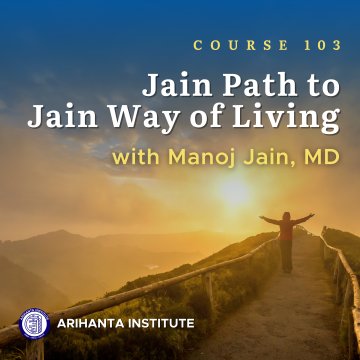
103 | Jain Path to Jain Way of Living
Added to cart
103 | Jain Path to Jain Way of Living
The course incorporates Jain core values as derived from the Tattvartha Sutra and shares Jain philosophy, principles and practices with participants.Our goal is to help people learn to live a Jain Way of Life with greater happiness and equanimity. The sessions will bring alive and simplify Jain Philosophy of Soul and Karma and Jain Principles of Ahimsa, Anekantvad, and Aparigraha using new paradigms. From these core beliefs we will connect to our modern day Jain Way of Life practices. Also, we will discuss and share Jain content with participants.
$99.00 USD
Instructor
Self-paced

104 | Introduction to Jainism through the Teaching of Shrimad Rajchandra
Introduction to Jainism – Beginner is an introductory class covering key tenets of Jainism. The course will introduce Lord Mahavir and Shrimad Rajchandra. Key Trana Mantrani Mala including Navkar Mantra, Sahajatma Swarupa Paramaguru, Paramaguru Nirgrantha Sarvajnadeva, and Atama Bhavana Bhavata Jiva Lahe Kevalajnana Re and their meanings will be covered. Introduction to daily prayers, prohibition of seven vyasans (sins), and importance of Jain diet will be covered.
$99.00 USD
Instructor
Self-paced

105 | Essence of Jainism Through the Teaching of Shrimad Rajchandra Agas
Essence of Jainism is an intermediate course which provides a solid foundation to Jain belief and covers a more advanced understanding of the key tenets of Jain principles, compassion for all living beings, importance of Agna Bhakti and path to peace and spirituality. This course is modified to understand the deeper meaning of daily bhakti, satsang and key mantra malas including the similarities of Navkar Mantra and Sahaj Atma Swaroop Paramguru, Paramguru Nirgranth Sarwagna Dev, and Atam Bhavna Bhava Ta Jiv Lahe Keval Gyan Re. Introduction to four gatis (life forms), five Indriyas (senses), four types of kashaya (type of emotions) is included. We will also cover the life of Laghuraj swami and Bharamachariji in accordance with Agas Ashram.
$99.00 USD
Instructor
Self-paced
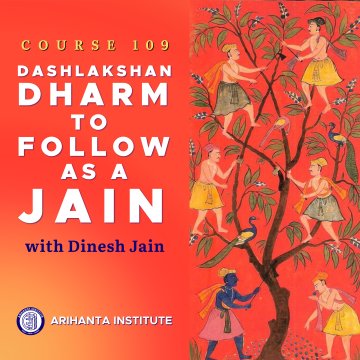
109 | Dashlakshan Dharm to Follow as a Jain
Added to cart
109 | Dashlakshan Dharm to Follow as a Jain
This course incorporates Ten Virtues that characterize Jain Faith as derived from the Tattvartha Sutras and shares basic Jain principles and practices with participants. My goal is to help people learn to be a Jain in Daily Life by possessing these characteristics that will make them peaceful and equanimous. The sessions will bring forth the explanation of these Ten Jain Virtues as propagated by the Arihantas to stop the influx of Karma and release previously accumulated Karmas peacefully by their own efforts. The explanations given will be simple, using everyday language and understanding. By understanding the principles outlined in the class, participants will become aware of Virtuous living.LEARNING OBJECTIVES:The Ten Virtues in Jain Faith – Presented in Day-to-Day contextJain Philosophy of Soul, Karma and Liberation as relevant to present lifeHow these Virtuous Practices could lead one to live a peaceful life and achieve Salvation.Greater awareness and knowledge of fundamental principles propounded in ancient scriptures relevant to modern life.Strengthen and unify our community.Make this world a better place for all life.Peaceful and Virtuous everyday life.
$99.00 USD
Instructor
Self-paced
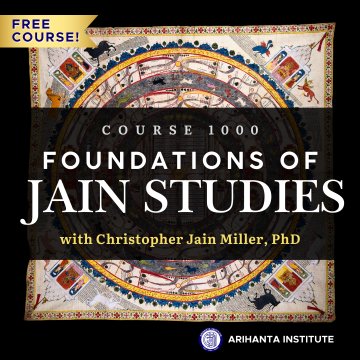
1000 | Foundations of Jain Studies
Added to cart
1000 | Foundations of Jain Studies
This course offers an introduction to Jain Studies. Begin with an exploration of key Jain teachings and practices, focusing on the principles of non-harming (ahiṃsā) and non-possession (aparigraha), both central to the tradition. Delve, then, into the Three Jewels of Jainism—right worldview, right knowledge, and right conduct—and examine how these principles shape the foundation of the Jain tradition. Next, investigate the profound connection between Jainism and animal advocacy, exploring the teachings of Mahavira on animals as well as contemporary Jain practices of animal care. Afterwards, explore the Jain perspective on the human body, including the importance of health, the role of karmas in shaping one’s embodiment, and the fine line between bodily renunciation and the need to have good health. Finally, observe how Jainism’s commitment to compassion and social justice is expressed through transformative social initiatives, focusing on the work of Acharya Chandanaji and the global reach of her charitable organization, Veerayatan. Learning Objectives:Understand the core principles of Jainism, including the practices of non-harming (ahiṃsā) and non-possession (aparigraha).Analyze the Three Jewels of Jainism (right worldview, right knowledge, and right conduct).Evaluate the relationship between Jainism and animal advocacy.Learn the Jain perspective on the human body and its role in spiritual practice.Assess the role of compassion and social justice in Jainism.
Free
Instructor
Self-paced

1001 | Jain Philosophy in Daily Life
Added to cart
1001 | Jain Philosophy in Daily Life
What do Jain teachings have to do with my life today? Learn how to answer this question with Jain philosophical texts that provide perennial guidance that applies to your most common everyday life situations.
$99.00 USD
Instructor
Self-paced
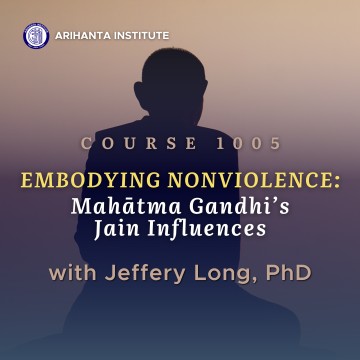
1005 | Embodying Nonviolence: Mahātma Gandhi’s Jain Influences
Mohandas K. Gandhi (1869-1948) is well known as the leader of India’s nonviolent struggle for independence from the British Empire. What is less well known is the great variety of traditions that went into making up Gandhi’s philosophy. These traditions include the Vaiṣṇava Hindu tradition in which he was born and raised, as well as the Jain tradition, a prominent tradition of his native state of Gujarat, which had a profound impact on his worldview and his advocacy of ahiṃsā–non-violence in thought, word, and action–in all aspects of life. This course will explore the considerable impact of Jain thought and practice on Mohandas Gandhi, and the role of the Jain tradition in his path to becoming the Mahātma: the great soul who has inspired generations not only of Indians, but of people around the world who yearn for the nonviolent transformation of global society. Of particular interest will be the teachings of Gandhiji’s Jain guru, Sri Rajchandra Mehta (1867-1901).
$99.00 USD
Instructor
Self-paced
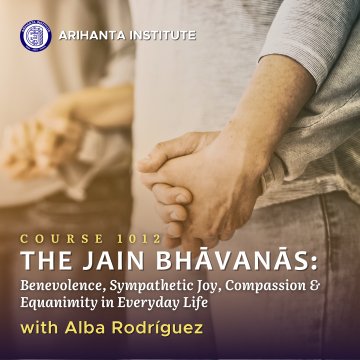
1012 | The Jain Bhāvanās: Benevolence, Sympathetic Joy, Compassion, and Equanimity in Everyday Life
Added to cart
1012 | The Jain Bhāvanās: Benevolence, Sympathetic Joy, Compassion, and Equanimity in Everyday Life
Explore the meanings, history, and practical applications of the cultivation of the Jain virtues of benevolence towards all living beings (maitrī), sympathetic joy for the virtuous (pramoda), compassion for the afflicted (kāruṇya), and equanimity towards the unvirtuous (mādhyastha). Begin by defining each term according to Jain textual sources. Next, appreciate the moral significance of these virtues and its various applications. Finally, with this conceptualization and history in mind, bring your fresh and deeper understanding of these virtues into the present and apply them in daily life. This course includes comparative study of the bhāvanās as they are interpreted and practiced in other dharma traditions. Learning Objectives:Understand the relevance of the four bhāvanās in Jain ethics and soteriology.Critically consider their context, and compare with other religious traditions.Bring your own insight of the bhāvanās into the present and apply them in daily life.
$99.00 USD
Instructor
Self-paced
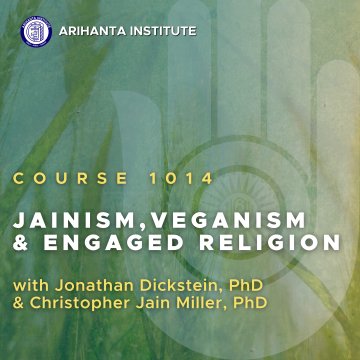
1014 | Jainism, Veganism, and Engaged Religion
Added to cart
1014 | Jainism, Veganism, and Engaged Religion
Committed to nonviolence (ahiṃsā) since its ancient beginnings, the Jain tradition has admonished the mistreatment, slaughter, sacrifice, and consumption of animals for thousands of years. In light of these commitments, Jains have traditionally lived a lacto-vegetarian lifestyle, advocated for the legal protection of animals, and have created sanctuaries for animals for centuries. In ancient and medieval scriptural sources, we even find restrictions on the consumption of dairy itself, suggesting potential pre-modern Jain commitments to what would now be referred to as a vegan lifestyle. And today, many Jains have been advocating for veganism in light of the devastating and irreparable harms involved in the production of dairy in contemporary society. This course carefully considers the philosophical and historical underpinnings of Jain Veganism, presenting an opportunity for non-Jain vegans to discover a rich philosophical system aligned with their values, as well as an opportunity for Jains to appreciate the philosophical resources within their own tradition which naturally lead to living an ethical vegan lifestyle.
$25.00 USD
Instructors
Self-paced
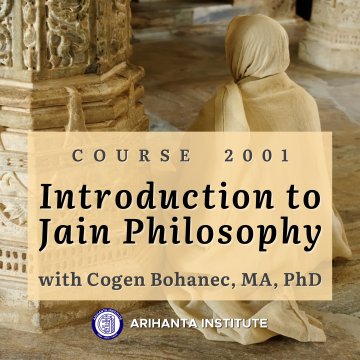
2001 | Introduction to Jain Philosophy
Added to cart
2001 | Introduction to Jain Philosophy
Refresh your understanding of Jain philosophy or embark on a journey to learn Jain philosophy from the ground up as you survey the Jain tradition’s fundamental philosophical insights
$99.00 USD
Instructor
Self-paced
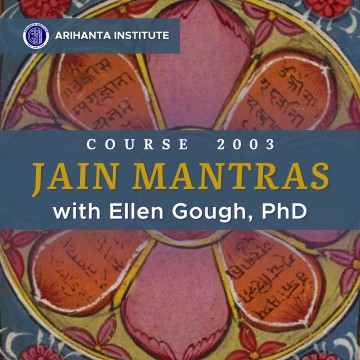
2003 | Jain Mantras
Added to cart
2003 | Jain Mantras
This course looks at how Jains, over a period of about 2,000 years, have developed their own mantras in conversation with both Hindus and Buddhists. We will examine the different versions and meanings of the most important Jain mantra, the pañcanamaskāra, and look at how mantras like OṂ HRĪṂ and ARHUṂ have been related to the soul, karmic destruction, and the path to liberation. Learning Objectives• Understand the histories of some important Jain mantras, especially the pañcanamaskāra/ṇamokār/navkār mantra• See how Jain mantras have been related to karma theory and the path to liberation• Compare Buddhist, Jain and Hindu interpretations of the mantras OṂ, HRĪṂ, and ARHAṂ/AHAṂ• Examine some ways in which mantras have been used in Jain rituals and material culture
$99.00 USD
Instructor
Self-paced
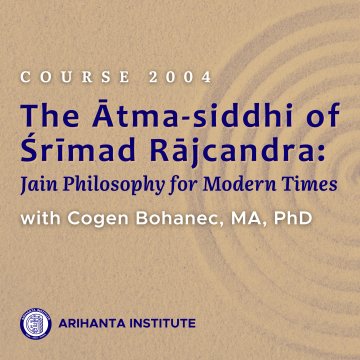
2004 | The Ātma-siddhi of Śrīmad Rājcandra: Jain Philosophy for Modern Times
This course will provide an overview of Jain Dharma based on an important text of the venerated Jain preceptor, Śrīmad Rājcandra. The trajectory of concepts covers Śrīmad’s philosophical proofs for the existence of an eternal soul as an agent, in relationship to bondage and liberation from karma. The approach of this course will be an analysis of these concepts in terms of various categories of philosophy with an inclination towards comparative religion and interfaith dialogue.
$99.00 USD
Instructor
Self-paced
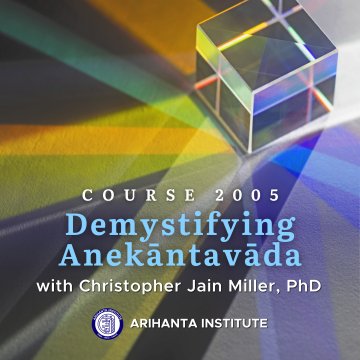
2005 | Demystifying Anekāntavāda
Added to cart
2005 | Demystifying Anekāntavāda
Explore the history, philosophies, and many meanings of the popular Jain concept known as “anekāntavāda”. Begin by exploring anekāntavāda’s rich history and understand why this term means much more than just “intellectual ahiṃsā”. Next, appreciate the philosophical complexity of anekāntavāda and its variant applications through nayavāda, syādvāda, saptabhaṅgī, and nikṣepa.Finally, with this philosophy and history in mind, bring your fresh and deeper understanding of anekāntavāda into the present and apply it to one of many important questions of contemporary society.
$99.00 USD
Instructor
Self-paced
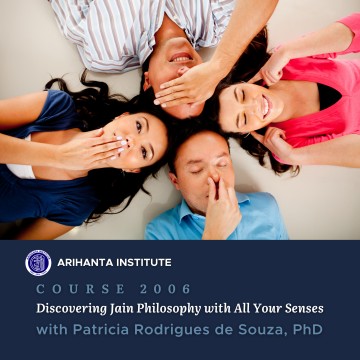
2006 | Discovering Jain Philosophy with All Your Senses
Added to cart
2006 | Discovering Jain Philosophy with All Your Senses
Modern life’s formal education, Western religious and philosophical systems as well as medical and social sciences make us have the impression that our soul, mind and body work separately, do not quite affect each other, and that mind rules everything. In the popular imagination, philosophy and religion are the places for the mind whereas the gym or doctor’s office are the places for the body.On the path to liberation, Jain dharma shows that soul, mind and body are integrated and that bodily conduct directly affects one’s incarnated spiritual journey. The field of the Anthropology of Senses, in its turn, has shown us that our engagement with specific material environments and practices – whether they are architectural aspects, icons, clothing, food, and other bodily aspects in daily life – shape our perceptions and conceptions about the world we live in, through processes of which we are not always aware, helping or preventing us from reaching true knowledge.The combination of Jain philosophy, explanations, and practices within the framework of the Anthropology of Senses provides means for unveiling daily (perceived as natural) knowledge-obscuring practices, which lead us to distorted perceptions about life and what we are doing here. The course aims to lead participants to an auto-observation regarding how they learn what they learn by exploring how an Anthropology of the Senses both informs, and is informed by, Jain tradition.
$99.00 USD
Instructor
Self-paced
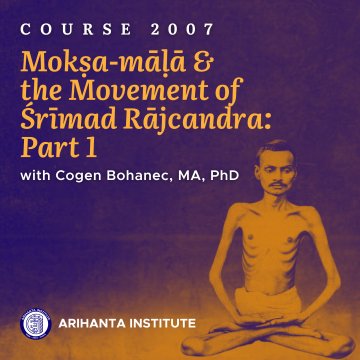
2007 | Mokṣa-māḷā & the Movement of Śrīmad Rājcandra: Part 1
Śrīmad Rājcandra (1867-1901) was an important Jain Saint of the late 19th and early 20th centuries who founded a distinct and modern, yet also in many ways quite orthodox, movement of Jainism. While Śrīmad and his followers followed many mainstream Jain teachings and practices, his teachings and the tradition that grew from them are distinct with regards to their emphasis on nonsectarianism, the ability to attain self-realization as a profound experience of one’s spiritual essence in this life or shortly thereafter, understanding of liberation as an attainable goal within 15 lifetimes, a critique of contemporary institutions of mendicancy, and the uniqueness of a bourgeoning lay movement where lay practitioners are the primary source of spiritual authority—a feature that has been widely appealing to Jain lay practitioners. The first half of this two-part course will examine how the events of Śrīmad’s life gave shape to this movement and will look at the philosophical underpinnings of Śrīmad’s tradition based on the Mokṣa-māḷā, a Gujarati text that he composed in 1887, at the age of 20, the same year that he was married, and several years before he attained self-realization and renounced worldly life. In the first half of this course, we will focus primarily on how Śrīmad’s philosophy was informed by notable events in his life, and how in turn these events and this philosophy have influenced the development of the Raj Bhakta Marg, the tradition that has developed from this important modern Jain guru. Learning Objectives:Learn the basic biographical outline of the life of Śrīmad Rajcandra.Understand the social and biographical events that led to the development of the Raj Bhakta Marga.Examine key features of the Raj Bhakta Marga that make it a unique modern Jain movement.
$99.00 USD
Instructor
Self-paced
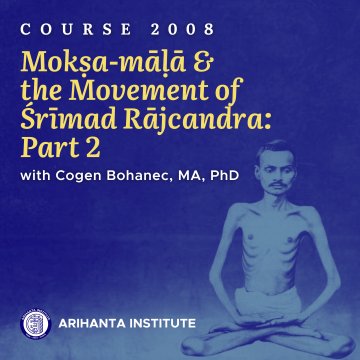
2008 | Mokṣa-māḷā & the Movement of Śrīmad Rājcandra: Part 2
As we have seen in the first half of this course, Śrīmad Rājcandra was an important Jain Saint of the late 19th and early 20th centuries who founded adistinct and modern, yet also in many ways quite orthodox, movement of Jainism known as the Raj Bhakta Marg. In the first half of this course, we focused primarily on how Śrīmad Rājcandra’s (1867-1901) philosophy was informed by notable events in his life, and how in turn these events and this philosophy have influenced the development of the Raj Bhakta Marg. In the second half of this class we will examine the features of Śrīmad’s philosophy in greater depth based primarily on the writings of the Mokṣa-māḷā (1887), but occasionally examining his Ātma-siddhi Śāstra (1896) as well. Moreover, we will examine the central concept of guru bhakti and discuss the importance of understanding Jain bhakti both within Śrīmad’s thought and tradition,but also within Jainism more broadly. We will closely examine how Śrīmad discussed various features of spiritual practice such as the importance of mantra recitation, sāmāyika and dhyāna meditation, and other practices intended to remove one’s karma and give one a direct experience of one’s spiritual essence. Finally, we will unpack the concise and elegant arguments that Śrīmad offers for the existence of an eternal soul—all discussions intended to both edify and inspire practitioners to dedicate themselves to an ardent spiritual practice where one might hope to attain self-realization and even liberation within 15 lifetimes—a significantly more attainable and immediate goal than what is often understood by many in the Jain tradition. Learning Objectives:Read and reflect on the teachings of Śrīmad’s Mokṣa-māḷā regarding themes of self-realization, bhakti, religious practices, and philosophical discourses including logical proofs for the existence of a soul.Understand the importance of Śrīmad’s emphasis of attaining self-realization and liberation, and how this relates to understanding him as a reformer or a revivalist.Examining key features of bhakti, especially guru bhakti, in the Śrīmad tradition and how this might inform a broader understanding of the importance and role of bhakti in the Jain tradition more broadly.Examine key features of religious practice advocated by Śrīmad and widely practiced by his followers including mantra recitation, sāmāyika, dhyāna, and guru-bhakti.Take time to reflect on philosophical principles of Śrīmad and applicability into daily life.Inquire into the deeper meanings and implications of the Śrīmad’s teachings in dialogue with other Jain teachings and other religious traditions.
$99.00 USD
Instructor
Self-paced
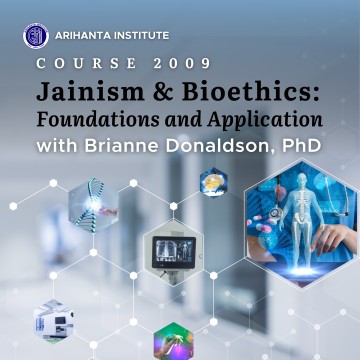
2009 | Jainism and Bioethics: Foundations and Application
Beyond its ethical aim of nonviolence, Jainism offers a rich account of birth, life, medicine, illness, and death. In this class, we will explore principles for bioethics in early Jain texts with some engagement with western normative ethical theories. We will also consider contemporary Jain views on reproductive ethics, antibiotics and vaccinations, animal ethics, organ donation, and dying and death in light of brief case studies. Learning ObjectivesIdentify unique Jain features of life and nonlife such as jīva, karma, multiple perspectivism.Describe how nonviolence fits in the wider Jain historical and soteriological framework.Articulate distinct Jain principles that apply to contemporary bioethical dilemmas.Compare features of Jain bioethical principles to western normative principles.
$99.00 USD
Instructor
Self-paced
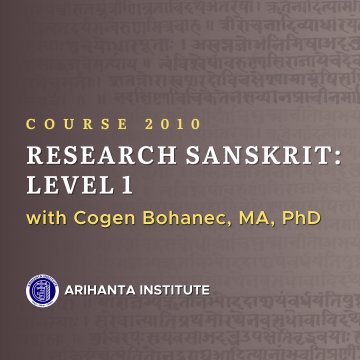
2010 | Research Sanskrit: Level 1
Added to cart
2010 | Research Sanskrit: Level 1
** This asynchronous, "self-study" course is self-paced and without live instruction. It is best suited for those who have some familiarity with Sanskrit or experience in learning other languages. For those wishing to study in a scheduled, live setting with a university professor, please enroll in 2012 | University Sanskrit 1 Live ** Competency with Sanskrit translation is a key skill for academics in the field of South Asian Studies. It is one of the most important research skills that provides scholars access to resources that are the object of their research. It is also a skill that, when demonstrated with translations in one's publications, gives a great deal of credibility to the academic work of scholars. Sanskrit can also be very helpful to strengthen and deepen one's connection to one's own spiritual tradition. For most Dharma traditions (Jainism, Hinduism, Buddhism, and Yoga), Sanskrit is often the medium of liturgical practices, and Sanskrit texts which tend to form the doctrinal, philosophical, and practical foundation for individual and collective spiritual practices in those traditions. Dharma traditions are deep reservoirs of spiritual wisdom that have the power to transform us personally and collectively in profound ways, and Sanskrit is one of the most important keys to unlocking that great reservoir of ancient spiritual wisdom that is much needed in our own personal lives, and in our collective society at large. In this self-study course, students will gain the important research skills necessary to translate Sanskrit texts by translating modified excerpts from Sanskrit literature. These research skills include basic philology such as etymology, the ability to identify inflexions and grammatical forms, and syntactical analyses. Asynchronous Sanskrit Training2010 | Research Sanskrit: Level 1 is a self-study, asynchronous course. It is the first of a two course series (2010 | Research Sanskrit: Level 1 and 2011 | Research Sanskrit: Level 2) offered by Professor Cogen Bohanec, MA, PhD and Arihanta Institute. Upon completion of both courses, students can expect to complete the Devavāṇīpraveśikā Sanskrit primer (Goldman and Goldman, 1980). In the process, students will learn to memorize, recognize, and recall all major paradigms of inflection (conjugations, declensions, indeclinable suffixes, prefixes, etc.) and use these skills when translating, reading, memorizing, or liturgically reciting Sanskrit texts. The option of asynchronous Sanskrit training is intended as an accessible learning option for self-motivated students who thrive in a self-paced learning environment. Students can move through the course material at their own pace, based on their ability and schedule. Since there are no live classes or synchronous instruction, and given the complexity of the subject matter, students will derive most benefit if they have previously studied Sanskrit, or if they are strongly committed to a daily routine of continued self-study over the course of a year or two, or perhaps longer (keeping in mind that when learning a new language, one should work through a primer more than once). This course may also be useful as a supplement for Sanskrit students who are enrolled in a Sanskrit studies university program, particularly if that course is using the Devavāṇīpraveśikā as a primer. Here, the two course series - 2010 | Research Sanskrit: Level 1 and 2011 | Research Sanskrit: Level 2 - can serve as a tutorial for research skills in basic philology (see “Learning Objectives” section below). Additionally, students who have previously participated in a Sanskrit program and are looking for a practical review, this course series provides a succinct and comprehensive opportunity to reinforce the necessary skills.Learning ObjectivesLearn to read Sanskrit in Devanagari font.Acquire basic Sanskrit vocabulary.Learn to identify and understand the basic grammatical forms covered in class.Learn to understand key differences between Sanskrit and English syntaxes and to be able to convert Sanskrit syntax into English syntax.Learn basic skills for translation of Sanskrit primary sources for researchBecome familiarized with other cultural and intellectual elements of the broader Sanskrit tradition.
$99.00 USD
Instructor
Self-paced
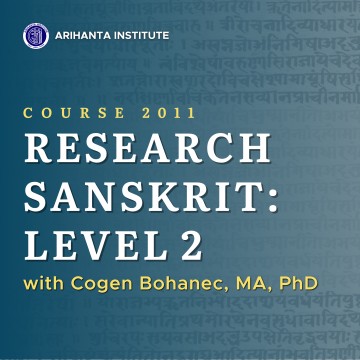
2011 | Research Sanskrit: Level 2
Added to cart
2011 | Research Sanskrit: Level 2
** This asynchronous, "self-study" course is the second level of self-paced Sanskrit and without live instruction. It is best suited for those who have completed 2010 Research Sanskrit: Level 1 and have some familiarity with Sanskrit or experience in learning other languages.**Competency with Sanskrit translation is a key skill for academics in the field of South Asian Studies. It is one of the most important research skills that provides scholars access to resources that are the object of their research. It is also a skill that, when demonstrated with translations in one's publications, gives a great deal of credibility to the academic work of scholars. Sanskrit can also be very helpful to strengthen and deepen one's connection to one's own spiritual tradition. For most Dharma traditions (Jainism, Hinduism, Buddhism, and Yoga), Sanskrit is often the medium of liturgical practices, and Sanskrit texts which tend to form the doctrinal, philosophical, and practical foundation for individual and collective spiritual practices in those traditions. Dharma traditions are deep reservoirs of spiritual wisdom that have the power to transform us personally and collectively in profound ways, and Sanskrit is one of the most important keys to unlocking that great reservoir of ancient spiritual wisdom that is much needed in our own personal lives, and in our collective society at large. In this self-study course, students will gain the important research skills necessary to translate Sanskrit texts by actually translating modified excerpts from Sanskrit literature. These research skills include basic philology such as etymology, the ability to identify inflexions and grammatical forms, and syntactical analyses. Asynchronous Sanskrit Training2011 | Research Sanskrit: Level 2 is a self-study, asynchronous course. It is the second of a two course series (2010 | Research Sanskrit: Level 1 and 2011 | Research Sanskrit: Level 2) offered by Professor Cogen Bohanec, MA, PhD and Arihanta Institute. Upon completion of both of these courses, students can expect to complete the Devavāṇīpraveśikā Sanskrit primer (Goldman and Goldman, 1980). In the process, students will learn to memorize, recognize, and recall all major paradigms of inflection (conjugations, declensions, indeclinable suffixes, prefixes, etc.) and use these skills when translating, reading, memorizing, or liturgically reciting Sanskrit texts. The option of asynchronous Sanskrit training is intended as an accessible learning option for self-motivated students who thrive in a self-paced learning environment. Students can move through the course material at their own pace, based on their own ability and schedule. Since there are no live classes or synchronous instruction in this course, and given the complexity of the subject matter, students will derive most benefit from this course if they have already studied Sanskrit in a previous course, or if they are strongly committed to a daily routine of continued self-study over the course of at least a year or two, or perhaps longer (keeping in mind that when learning a new language, one should work through a primer more than once). This course may also be useful as a supplement for Sanskrit students who are enrolled in a Sanskrit studies university program, particularly if that course is using the Devavāṇīpraveśikā as a primer. Here, the two course series - 2010 | Research Sanskrit: Level 1 and 2011 | Research Sanskrit: Level 2 - can serve as a tutorial for research skills in basic philology (see “Learning Objectives” section below). Additionally, students who have previously participated in a Sanskrit program and are looking for a practical review, this course series provides a succinct and comprehensive opportunity to reinforce the necessary skills. Learning ObjectivesLearn to read Sanskrit in Devanagari font.Acquire basic Sanskrit vocabulary.Learn to identify and understand the basic grammatical forms covered in class.Learn to understand key differences between Sanskrit and English syntaxes and to be able to convert Sanskrit syntax into English syntax.Learn basic skills for translation of Sanskrit primary sources for research.Become familiarized with other cultural and intellectual elements of the broader Sanskrit tradition.
$99.00 USD
Instructor
Upcoming
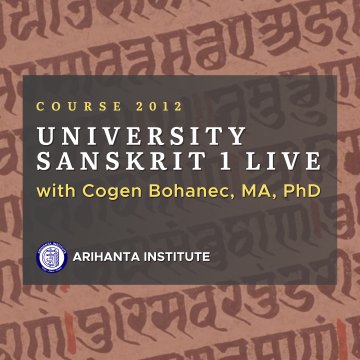
2012 | University Sanskrit 1 Live
Added to cart
2012 | University Sanskrit 1 Live
This synchronous, "live" online course is a 16-week seminar for those wishing to study Sanskrit in a scheduled, live setting with a university professor (class meets twice a week). For those looking to study in a self-paced, asynchronous course, please enroll in 2010 | Research Sanskrit: Level 1. In this course, which is the first of a two course series, students will complete the equivalent of their first semester of graduate level Sanskrit. Students will gain necessary competency for Sanskrit 1 as well as the important research skills necessary to translate Sanskrit texts by translating modified excerpts from Sanskrit literature. These research skills include basic philology such as etymology, the ability to identify inflexions and grammatical forms, and syntactical analyses. This course will be divided into two sections. Upon completion of both of these sections, we will have completed the Devavāṇīpraveśikā Sanskrit primer (Goldman and Goldman, 1980). In the process, students will learn to memorize, recognize, and recall all major paradigms of inflection (conjugations, declensions, indeclinable suffixes, prefixes, etc.) and use these skills when translating, reading, memorizing, or liturgically reciting Sanskrit texts. Competency with Sanskrit translation is a key skill for academics in the field of South Asian Studies. It is one of the most important research skills that gives scholars access to resources that are the object of their research, and it is also a skill that, when demonstrated with translations in one’s publications, gives a great deal of much needed credibility to the academic work of scholars. Sanskrit can also be very helpful to strengthen and deepen one’s connection to one’s own spiritual tradition. For most Dharma traditions (Jainism, Hinduism, and Buddhism), Sanskrit is often the medium of liturgical practices, and Sanskrit texts also tend to form the doctrinal, philosophical, and practical foundation for individual and collective spiritual practices in those traditions. Dharma traditions are deep reservoirs of spiritual wisdom that have the power to transform us personally and collectively in profound ways, and Sanskrit is on one of the most important keys to unlocking that great reservoir of ancient spiritual wisdom that is much needed in our own personal lives, and in our collective society at large. Learning ObjectivesLearn to read Sanskrit in Devanagari font.Acquire basic Sanskrit vocabulary.Learn to identify and understand the basic grammatical forms covered in class.Learn to understand key differences between Sanskrit and English syntaxes and to be able to convert Sanskrit syntax into English syntax.Learn basic skills for translation of Sanskrit primary sources for researchBecome familiarized with other cultural and intellectual elements of the broader Sanskrit tradition.
 Coming Fall 2025
Coming Fall 2025$500.00 USD
Instructor
Live Online
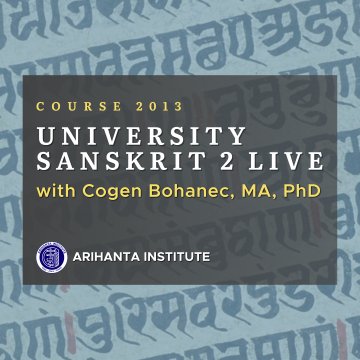
2013 | University Sanskrit 2 Live
Added to cart
2013 | University Sanskrit 2 Live
**This synchronous, "live" online course is a university length (16-week) seminar for those wishing to study Sanskrit in a scheduled, live setting with a university professor (class meets twice a week, Mondays and Fridays at 9:30 a.m. - 10:55 a.m. Pacific). For those looking to study in a self-paced, asynchronous course, please enroll in 2011 | Research Sanskrit: Level 2** In this course, which is Part 2 of 2 (see Course 2012 for first part), students will complete the equivalent of their second semester of graduate level Sanskrit. Students will gain necessary competency for Sanskrit 2 as well as the important research skills necessary to translate Sanskrit texts by translating modified excerpts from Sanskrit literature. These research skills include basic philology such as etymology, the ability to identify inflexions and grammatical forms, and syntactical analyses. Upon completion of this course (and its prerequisite Course 2012), we will have completed the Devavāṇīpraveśikā Sanskrit primer (Goldman and Goldman, 1980). In the process, students will learn to memorize, recognize, and recall all major paradigms of inflection (conjugations, declensions, indeclinable suffixes, prefixes, etc.) and use these skills when translating, reading, memorizing, or liturgically reciting Sanskrit texts. Competency with Sanskrit translation is a key skill for academics in the field of South Asian Studies. It is one of the most important research skills that gives scholars access to resources that are the object of their research, and it is also a skill that, when demonstrated with translations in one’s publications, gives a great deal of much needed credibility to the academic work of scholars. Sanskrit can also be very helpful to strengthen and deepen one’s connection to one’s own spiritual tradition. For most Dharma traditions (Jainism, Hinduism, and Buddhism), Sanskrit is often the medium of liturgical practices, and Sanskrit texts also tend to form the doctrinal, philosophical, and practical foundation for individual and collective spiritual practices in those traditions. Dharma traditions are deep reservoirs of spiritual wisdom that have the power to transform us personally and collectively in profound ways, and Sanskrit is on one of the most important keys to unlocking that great reservoir of ancient spiritual wisdom that is much needed in our own personal lives, and in our collective society at large. Learning Objectives:1. Learn to read Sanskrit in Devanagari font.2. Acquire basic Sanskrit vocabulary.3. Learn to identify and understand the basic grammatical forms covered in class.4. Learn to understand key differences between Sanskrit and English syntaxes and to be able to convert Sanskrit syntax into English syntax.5. Learn basic skills for translation of Sanskrit primary sources for research.6. Become familiarized with other cultural and intellectual elements of the broader Sanskrit tradition.
 16-week Live Course: January 27 - May 16, 2025
16-week Live Course: January 27 - May 16, 2025$500.00 USD
Instructor
Self-paced
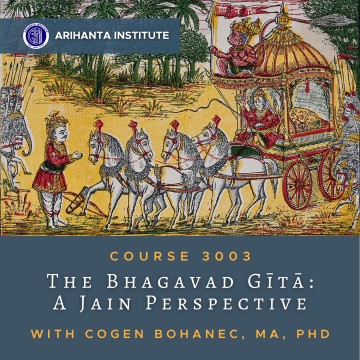
3003 | The Bhagavad Gītā: A Jain Perspective
Added to cart
3003 | The Bhagavad Gītā: A Jain Perspective
Engage in a deep interfaith dialogue between Jain Dharma and the Bhagavad-gītā (generally considered to be a Hindu text) by following the basic principles of interfaith dialogue and peacebuilding that are paradigmatic to a variety of sources in the Jain tradition (e.g. the works of Haribhadrasūri, Hemacandra, and Śrīmad Rājchandra). Examine the shared understandings of yoga practice between Jain traditions and that which is advocated in the Bhagavad-gītā, while also underscoring the doctrinal uniqueness of Jain Dharma in terms of metaphysics, epistemology, divinity, and other philosophical concepts. The result is an approach to religious pluralism that advocates for friendship between diverse traditions by showing how a Jain reading of the Bhagavad-gītā can provide a foundation for mutual respect and the valuation of religious and spiritual diversity.
$99.00 USD
Instructor
Self-paced
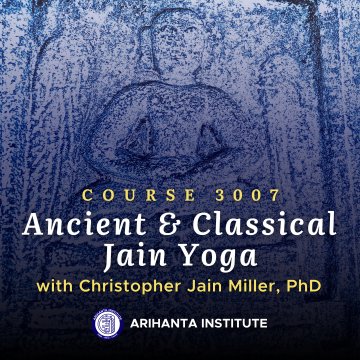
3007 | Ancient and Classical Jain Yoga
Added to cart
3007 | Ancient and Classical Jain Yoga
This course provides an in-depth exploration of yoga and meditation as understood within ancient and classical Jain scriptures. In Part 1: Ancient Jain Yoga, students will be introduced to foundational concepts such as āsana, or physical postures, as a tool for purification and meditation. Drawing from early Jain texts, including the Uttarādhyayanasūtra and the Daśavaikālikasūtra, students will learn how restraint of the body, mind, and speech formed early Jain definitions of yoga. Part 2: Yoga and Meditation in Classical Jain Philosophy, transitions into an examination of the Tattvārthsūtra and its commentaries, where yoga is described as the inflow (āsrava) of karma—representing an obstacle to spiritual liberation. Students will explore the key to liberation through correct worldview, knowledge, and conduct, as well as the role of dhyāna (meditation) as both an austerity (tapas) and a means of wearing away (nirjarā) karma. Through a discussion of virtuous (dharma) and pure (śukla) meditation, the course will highlight how advanced meditation practices lead to spiritual purification and the elimination of karma, providing a comprehensive understanding of Jain yoga's ultimate aim of mokṣa, or liberation. This is designed as a two-week course that will take approximately 4 hours to complete, and includes readings and a series of 10 lectures to guide you through the intricacies of ancient and classical Jain definitions of Yoga. Learning Objectives:Learn the role of āsana (physical postures) in ancient Jain yoga as a tool for purification and meditation.Discover how restraint of body, mind, and speech formed early Jain definitions of yoga, with guidance from key ancient texts.Explore the classical Jain philosophical view of yoga as the inflow (āsrava) of karma, and see how this concept is discussed in the Tattvārthsūtra and its commentaries.Understand how meditation (dhyāna) serves as an austerity (tapas) to wear away karma (nirjarā) and how virtuous (dharma) and pure (śukla) meditation practices lead to spiritual purification and liberation (mokṣa).
$99.00 USD
Instructor
Self-paced
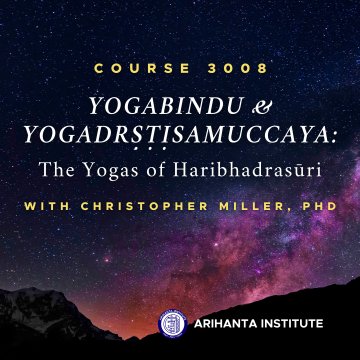
3008 | Yogabindu & Yogadṛṣṭisamuccaya: The Yogas of Haribhadrasūri
This course offers a close exploration of the teachings and historical contexts of two significant teachers of early Śvetāmbara Jain yoga: Haribhadra Virahāṇka and Haribhadra Yākinīputra.Beginning with an introduction to Haribhadra Virahāṇka’s (ca. 6 th c. CE) hagiography, we will examine how his legendary name reflects the Jain path to liberation (mokṣa), setting the stage for a study of his yoga texts aimed for the same goal: the Yogabindu and Yogaśataka. In addition to looking at the limited historical evidence regarding Haribhadra Virahāṇka’s tentative 6 th c. CE dating, the course will analyze Haribhadra’s categorization of yoga practitioners into three levels, with a focus on the cāritrin (pathgoer), who embodies the path of comprehensive Jain yoga practice. Through a detailed examination of the five types of yoga in the Yogabindu, students will understand how these practices facilitate liberation according to Jain karma theory. Students will also appreciate how the Yogabindu represents Jainism’s first-known exposition of “yoga” as a spiritual path, rather than something that causes the inflow of karma as understood in the preceding classical period.Transitioning to Haribhadra Yākinīputra (ca. 8 th c. CE), the course will delve into his hagiography as well as his distinct contributions to Jain yoga, the Yogadṛṣṭisamuccaya and Yogaviṁśikā. We will investigate how Haribhadra Yākinīputra is historically (and tentatively) dated to the 8 th c. CE, while also appreciating how he both integrates but also simultanesouly critiques various traditions such as tantra, Buddhism, and Brahmanism within his Jain framework. Finally, students will understand how Haribhadra maps his yoga philosophy onto not only Patañjali’s 8-limbed yoga but also Jain concepts including the 14 guṇasthānas. Students will appreciate how the two Haribhadras put their respective Jain teachings into dialogue with other religious and philosophical traditions, while maintaining a commitment to their own Jain tradition.This is designed as a two-week course that will take approximately 4 hours to complete, and includes readings and a series of 10 lectures to guide you through the intricacies of the yogas of Haribhadra Virahāṇka and Haribhadra Yākinīputra. It is recommended, though not required, that students complete course 3007 “Ancient and Classical Jain Yoga” before taking this course if they wish to have further background on Jain yoga. Learning Objectives:1. Learn the histories and hagiographies of Haribhadra Virahāṇka and Haribhadra Yākinīputra to understand how their legendary names were created.2. Understand Haribhadra Virahāṇka’s categorization of yoga practitioners, focusing on the cāritrin and the five types of yoga practices in the Yogabindu, to grasp their role in facilitating liberation through Jain karma theory.3. Learn the contributions of Haribhadra Yākinīputra to Jain yoga, especially hisYogadṛṣṭisamuccaya, and how he critiques and integrates various traditions such as tantra, Buddhism, and Brahmanism within his yoga framework.
$99.00 USD
Instructor
Upcoming
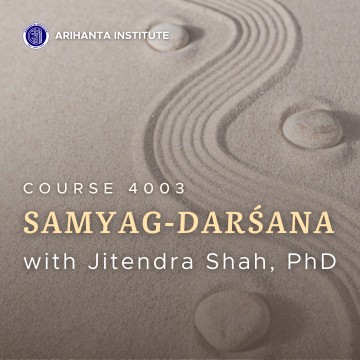
5001 | Samyag-darśana
Added to cart
5001 | Samyag-darśana
सम्यग्दर्शन: जैन दर्शन की मूलभूत अवधारणा का दार्शनिक विश्लेषण जैन दर्शन भारतीय दार्शनिक परंपरा का एक अत्यंत सूक्ष्म, तत्त्वनिष्ठ एवं आत्मसाक्षात्कारोन्मुखी दृष्टिकोण है, जिसकी मौलिकता आत्मा के स्वाभाविक शुद्ध स्वरूप की पुनःप्राप्ति में निहित है। इसके अनुसार, जीव के बंधन का मूल कारण अविद्या, राग, द्वेष, और मिथ्यात्व है। इन बंधनों से मुक्ति प्राप्त करना ही मोक्ष है, जो जैन मत में जीवन का चरम और परम लक्ष्य है।मोक्ष की सिद्धि सम्यग्दर्शन, सम्यग्ज्ञान, और सम्यक् चारित्र — इन त्रिविध साधनाओं से होती है, जिन्हें सामूहिक रूप से "रत्नत्रयी" कहा गया है। इनमें सम्यग्दर्शन को प्रवेशद्वार का स्थान प्राप्त है। इसका तात्पर्य आत्मा की प्रकृति, तत्त्वों की वास्तविकता, और जीवन के लक्ष्य के प्रति श्रद्धायुक्त स्पष्ट दृष्टि से है। उपयोगिताछात्र सम्यग्दर्शन के शास्त्रीय, व्यावहारिक, और आध्यात्मिकपक्षों को स्पष्ट रूप से समझ पाएंगे।वे मिथ्यात्व के लक्षणों को पहचानकर आत्म-निरीक्षण कर सकेंगे।सम्यग्दर्शन की प्राप्ति की प्रक्रिया को समझकर अपने साधना पथ को सुस्पष्ट बना सकेंगे।सम्यग्दर्शन के आधार पर मोक्षमार्ग का सारगर्भित चिंतन कर सकेंगे। Samyag-darśana: A philosophical analysis of the foundational concept in Jain philosophy Jain philosophy is a profoundly subtle, truth-centered, and self-realization-oriented perspective among the Indian philosophical traditions. Its fundamental conviction is in the re-attainment of the soul’s intrinsic pure nature. According to Jain thought, the root causes of the soul’s bondage are ignorance (avidyā), attachment (rāga), aversion (dveṣa), and deluded perception (mithyātva), and elimination of these bondages leads to mokṣa itself, which is regarded as the greatest and ultimate goal of human life in Jainism. The attainment of mokṣa is made possible through the triad of samyag-darśana (right perception), samyag-jñāna (right knowledge), and samyag-cāritra (right conduct), collectively known as the ratnatraya (Three Jewels). Among these, samyag-darśana is accorded the status of the initiator. Its attainment implies a reverence-filled unblemished perception of the nature of the soul, unwavering belief in fundamental principles (tattvas), and the true purpose of life. Learning Objectives:• Understand the importance of samyag-darśana in the spiritual journey.• Identify forms of Mithyatva (false beliefs) and their classifications.• Define samyag-darśana and explore its various types.• Learn about the sequence of attaining samyag-darśana and the concept of Granthibheda (breaking of knots of delusion).• Explore the eight limbs (aṅgas) of samyag-darśana.• Analyze the offenses (dūṣaṇa) and ornaments (bhūṣaṇa) of samyag-darśana.• Recognize samyag-darśana as the foundational step in the path of self-realization.• Understand the relationship between samyag-darśana and svānubhūti (direct self-experience).
 This course meets live on Zoom, weekly on Saturdays (Aug 30 - Nov 29 at 8 AM PT | 4 PM UK | 8:30 PM IST).
This course meets live on Zoom, weekly on Saturdays (Aug 30 - Nov 29 at 8 AM PT | 4 PM UK | 8:30 PM IST).$99.00 USD
Instructor
Animal Advocacy & Biodiversity
Self-paced

101 | Ahimsa, Animal Advocacy, and Veganism
Added to cart
101 | Ahimsa, Animal Advocacy, and Veganism
This course will focus on animal advocacy, ethics, and veganism. We will delve deep into the multiple reasons to live vegan and how a Jain ethic parallels with animal protection. The course is designed for Jains who want to learn more about veganism and for vegans and pre-vegans who are interested in learning more about Ahimsa and Jain Dharma. We will explore modern animal farming, animal agriculture’s environmental impact, fishing and our oceans, and more. Join us to learn about how the Jain way of life and ethical vegan living support and nurture each other.
$99.00 USD
Instructor
Self-paced

102 | Beyond Vegetarianism: Jain Veganism and the Promotion of Ahiṃsā
The first of its kind collaboration between the Jain Vegan Initiative and JAINA’s Ahimsak Eco-Vegan Committee, Arihanta Academy brings a course focused on veganism through the lens of applied Jainism. Throughout history, Jains have been at the forefront of promoting non-violence, with consideration of life extending to the microscopic level. Parallels can be found in ethical veganism, animal rights, environmentalism, and social justice. Those not familiar with veganism are welcome to join but prior knowledge is useful. The primary intention of this course is to serve as an introductory educational resource for those Jains who are already vegan or vegan-curious, to equip them with current, accurate information with which to promote a non-violent lifestyle.
$99.00 USD
Instructors
Self-paced

111 | Animal-Centered Design
Added to cart
111 | Animal-Centered Design
Non-human animals are routinely used for profit or product, and as a result, suffer greatly in our society. Animal sanctuaries provide a glimpse of a different world; one in which animals are provided with protected spaces and treated as equals. A new initiative is taking shape that can aid sanctuaries, and individuals, in their goal of bettering animals' lives: Animal-Centered Design (ACD). In this course you will learn the basic principles of ACD, study examples of it in action within sanctuary settings, and consider how ACD can be applied to companion animals and beyond. This course will also touch on passive solar design, focusing on how proper orientation to the natural elements can benefit both animals and our environment. Readings and assignments are provided throughout the course to engage you directly in the animal sanctuary design process and to inspire you to make a positive change for animals.A portion of the proceeds for this course support Piedmont Farm Animal Refuge.Learning Objectives: Class 1: Introduction to Farmed Animal SanctuariesClass 2: Principles of Animal-Centered DesignClass 3: Precedents in Animal-Centered DesignClass 4: Case Study I-Designing Spaces for GoatsClass 5: Case Study II-Designing Spaces for DucksClass 6: Animal-Centered Design for Companion AnimalsClass 7: Passive Solar Design Strategies for Animal Spaces
$99.00 USD
Instructors
Self-paced

1000 | Foundations of Jain Studies
Added to cart
1000 | Foundations of Jain Studies
This course offers an introduction to Jain Studies. Begin with an exploration of key Jain teachings and practices, focusing on the principles of non-harming (ahiṃsā) and non-possession (aparigraha), both central to the tradition. Delve, then, into the Three Jewels of Jainism—right worldview, right knowledge, and right conduct—and examine how these principles shape the foundation of the Jain tradition. Next, investigate the profound connection between Jainism and animal advocacy, exploring the teachings of Mahavira on animals as well as contemporary Jain practices of animal care. Afterwards, explore the Jain perspective on the human body, including the importance of health, the role of karmas in shaping one’s embodiment, and the fine line between bodily renunciation and the need to have good health. Finally, observe how Jainism’s commitment to compassion and social justice is expressed through transformative social initiatives, focusing on the work of Acharya Chandanaji and the global reach of her charitable organization, Veerayatan. Learning Objectives:Understand the core principles of Jainism, including the practices of non-harming (ahiṃsā) and non-possession (aparigraha).Analyze the Three Jewels of Jainism (right worldview, right knowledge, and right conduct).Evaluate the relationship between Jainism and animal advocacy.Learn the Jain perspective on the human body and its role in spiritual practice.Assess the role of compassion and social justice in Jainism.
Free
Instructor
Self-paced

1006 | Jain Dharma and Animal Advocacy
Added to cart
1006 | Jain Dharma and Animal Advocacy
According to Jain dharma, we live in an interconnected web of life in which no creature, human or non-human, wants to be harmed. For this reason, the Jain tradition has taught ahiṃsā, or non-violence, to all forms of life for thousands of years. Learn why the Jain tradition places particular emphasis on non-violence toward non-human animals, and how these Jain perspectives can be brought into conversation with contemporary animal advocacy concerns. Leave the course inspired to advocate for the well-being of all forms of life.
$99.00 USD
Instructor
Self-paced
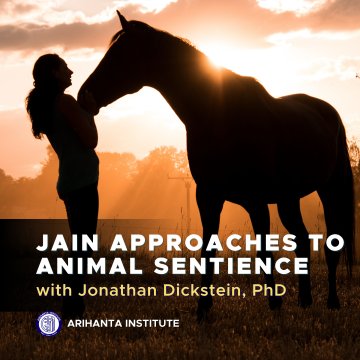
1011 | Jain Approaches to Animal Sentience
Added to cart
1011 | Jain Approaches to Animal Sentience
Jainism’s foundational ethical principle of non-harming assumes that living beings can be harmed by the acts of others. The ability to be harmed by others is not shared by all entities, as neither Jainism or mainstream science maintains that brute objects such as tables or bricks can be, technically speaking, “harmed.” Learn Jain and non-Jain perspectives on the differences between sentient and insentient entities; Jain categorizations of plant and animal life; modern philosophical and scientific approaches to sentience; the relationship of sentience to ethics; and the theoretical and ethical challenges posed by entities such as plants, insects, bivalves, and other beings. All suggested course readings are provided as links and pdfs throughout the course.Learning Objectives:* Answer the question “What is Sentience?” and learn western scientific approaches to sentience* Learn Jain approaches to sentience which consider sense faculties and minds* Understand the connections between sentience, pain, and ethics* Look at sentience “on the fringes” including questions around plants, bivalves, and other beings
$99.00 USD
Instructor
Self-paced

1014 | Jainism, Veganism, and Engaged Religion
Added to cart
1014 | Jainism, Veganism, and Engaged Religion
Committed to nonviolence (ahiṃsā) since its ancient beginnings, the Jain tradition has admonished the mistreatment, slaughter, sacrifice, and consumption of animals for thousands of years. In light of these commitments, Jains have traditionally lived a lacto-vegetarian lifestyle, advocated for the legal protection of animals, and have created sanctuaries for animals for centuries. In ancient and medieval scriptural sources, we even find restrictions on the consumption of dairy itself, suggesting potential pre-modern Jain commitments to what would now be referred to as a vegan lifestyle. And today, many Jains have been advocating for veganism in light of the devastating and irreparable harms involved in the production of dairy in contemporary society. This course carefully considers the philosophical and historical underpinnings of Jain Veganism, presenting an opportunity for non-Jain vegans to discover a rich philosophical system aligned with their values, as well as an opportunity for Jains to appreciate the philosophical resources within their own tradition which naturally lead to living an ethical vegan lifestyle.
$25.00 USD
Instructors
Self-paced

1015 | Debunking the Myth of Sustainable and Humane Animal Agriculture
In this course, we will focus on the “greenwashing” and “humanewashing” by animal agriculture. “Greenwashing” is based on the different ways that animal agriculture pretends it is sustainable when it is not; “humanewashing” refers to the different ways that animal agriculture pretends it treats animals well, when it does not. In reality, animal agriculture is one of the single largest drivers of climate change and one of the most cruel industries imaginable; however, much like the tobacco industry and the fossil fuel industries before it, animal agriculture has responded to this reality not by enacting any substantive changes, but by relying on “tricks” of communication, including public relations, media relations, marketing, and even attempts to influence scholarship on the topic to confuse the public and hide their destructive practices. In this course, we will debunk these rhetorical tricks and expose the reality of the harms animal agriculture is causing to both animals and our planet. This course should be of benefit to any activist, policy maker, or person concerned about climate change, environmental destruction, or animal suffering. Course Details6 hours of recorded video contentWeekly readings for self-studyAccess to class materials begins Monday, August 5, 20244 scheduled Live Q&A sessions with Professor Stanescu on August 9, 16, 23, and 30 from 9AM to 10AM Pacific + Bonus Session Sept. 6!
$25.00 USD
Instructor
Self-paced
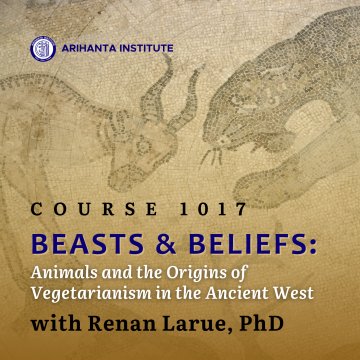
1017 | Beasts & Beliefs: Animals and the Origins of Vegetarianism in the Ancient West
While the study of certain aspects of the ancient world may derive from mere intellectual curiosity, the study of other aspects is absolutely essential for our understanding of current social, political, and environmental circumstances. The latter dynamic is certainly the case with the history of ancient ideas about “the human” and “the animal.” These ideas, taken up and developed over centuries by Christian theologians and humanist philosophers, have shaped the radically anthropocentric worldview of Western nations. Most Europeans and North Americans are simply unconcerned with how we torture and kill billions of animals each year. They live, without knowing it, in a mental universe constructed by a handful of Greek and Roman philosophers. To escape this universe, it is useful and perhaps even necessary to know what Chrysippus, Epicurus, Cicero, or Saint Augustine said about animals and humans’ interactions with them. The objective of this course is to study—alongside the many pleas of the vegetarian philosophers of antiquity—the incomplete but triumphant responses of their carnist adversaries. Course Details6 hours of recorded video contentWeekly readings for self-studyPlus+ 4 x 60-minute recorded Q&A sessions with Professor Larue
$25.00 USD
Instructor
Self-paced
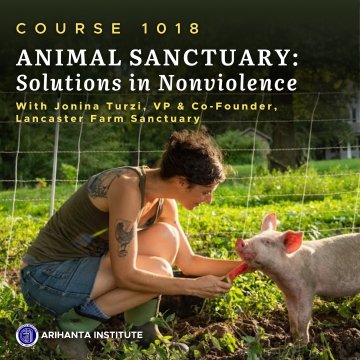
1018 | Animal Sanctuary: Solutions in Nonviolence
Added to cart
1018 | Animal Sanctuary: Solutions in Nonviolence
Animals farmed for food and resources are among the most exploited, abused, and suffering beings on the planet. There have long been groups of humans trying to rescue them and advocate for their rights, possibly for as long as they have been enslaved and commodified—around 10-12,000 years. For the last 40 years or so, this movement includes organizations called a “Farm Sanctuary”—a place where farmed animals who have been neglected, surrendered, found, or liberated are cared for and supported in living out their natural lives. This course will look at the history, philosophy, ethics, practices, and cultural/ecological implications of farm animal sanctuaries as an approach to ahimsa. Leave with a deeper and broader kinship to the community with whom we share the planet. Course Details6 hours of recorded video contentWeekly readings for self-study4 scheduled, 60-minute Live Q&A sessions with Professor Jonina Turzi on January 31, February 7, 14, and 21 from 9-10 a.m. PSTCourse Materials will be available beginning Monday, January 27, 2025
$25.00 USD
Instructor
Self-paced
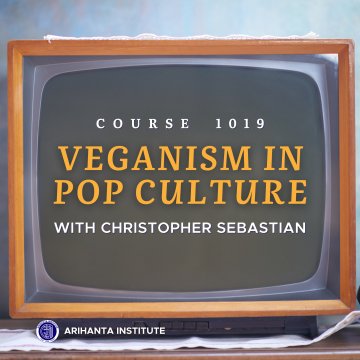
1019 | Veganism in Pop Culture
Added to cart
1019 | Veganism in Pop Culture
This course will look at fictional representations of animal advocacy; vegan practices and values like recognition and compassion; and farmed, free living, and companion animals in popular Anglophone, Western popular media, and participants will learn how these have shaped our relationships to animals and animal ethics in modern history.bell hooks discusses her book Outlaw Culture in relation to her concerns with problematic patterns appearing in popular culture. She tells how sometimes she found the best way to teach students or individuals about "otherness" was by relating it to a medium they were familiar with, the media and popular culture. Unlike critical theory that may be hard for a lot of people to access or understand, popular culture is for the masses and is easily understood. Thus, the masses are far more likely to be educated by popular culture rather than theory-based essays.
$25.00 USD
Instructor
Live Online
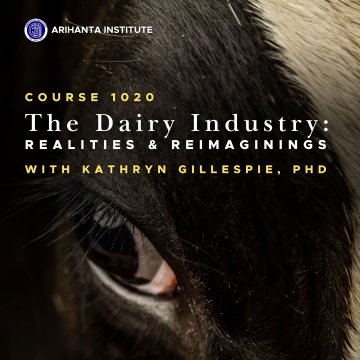
1020 | Foundations of Animal Ethics
Added to cart
1020 | Foundations of Animal Ethics
Many sense that something is very wrong in the way that humans treat animals, but also may struggle to articulate why that is the case. This course offers a survey of some significant ways that scholars and activists have articulated systematic accounts for why we ought to seriously value animal life. We will do so not solely for academic interest, but because understanding the “why” of animal ethics is crucial to shaping the “how” of individual and political action to reduce animal suffering and domination. We will examine: the contemporary state of animal suffering, foundational theories for ethically considering animal life, and the academic cutting edge of animal issues.
 Course begins Monday, August 4, 2025 + 4 Live Zoom Q&A sessions August 8, 15, 22, and 29 at 9 a.m. PDT.
Course begins Monday, August 4, 2025 + 4 Live Zoom Q&A sessions August 8, 15, 22, and 29 at 9 a.m. PDT.$25.00 USD
Instructor
Upcoming
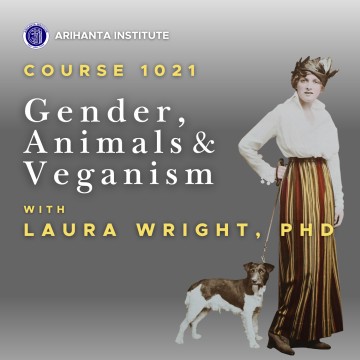
1021 | Gender, Animals, and Veganism
Added to cart
1021 | Gender, Animals, and Veganism
In the West, despite considerable evidence to the contrary, veganism continues to be viewed as the purview of a white, upper-middle class left-leaning subculture. It is often depicted as an elitist endeavor. It is gendered as a female undertaking and, therefore, often dismissed as naively emotionally motivated—or characterized as disordered consumption.In this course, we will examine the role that gender plays in vegan identity and the ways that vegan studies offers a lens through which to read and understand a variety of texts —both fictional and nonfictional—that engage with the oppression of animals and of humans. In all of the texts we will discuss, the female protagonists’ veganism renders them vulnerable to interpretations not of their own making, a striking pattern that we will analyze in detail.
 Course materials available on Monday, Sept 15, 2025 + 4 Live Zoom Q&A sessions Sept 19, 26, Oct 3, and 10 at 9 a.m. PDT.
Course materials available on Monday, Sept 15, 2025 + 4 Live Zoom Q&A sessions Sept 19, 26, Oct 3, and 10 at 9 a.m. PDT.$25.00 USD
Instructor
Climate Change & Environment
Self-paced
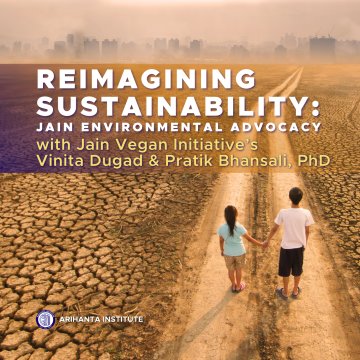
106 | Reimagining Sustainability: Jain Environmental Advocacy
The Jain Vegan Initiative brings this course designed to introduce the connection between Jain Philosophy and Environmentalism. It introduces a unique lens for looking at the environment by understanding how various communities are affected differently, and how measurements of environmental impact that take into global average impacts dilute a sense of urgency. The stress-free transition from being part of the problem to being a part of the solution in a busy and rapidly urbanizing life will be discussed. The course will entail action oriented self-assessment and discussion regarding effective ways of spreading environmental awareness. Learning Objectives:Looking at the environment and environmental action from the Jain lens.Learning about how using global averages to assess environmental impact dilutes the sense of urgency and the disproportionate impact on different communities.Understanding how ignoring the effects of day to day individual choices may imply participation in propagating injustice.Learning how our individual actions are tied to systemic problems of capitalism and consumerism.Obtaining a practical, stress-free, and planned approach to lifestyle transition in a busy, rapidly urbanizing life, and some ways of creating increased environmental awareness
$99.00 USD
Instructors
Self-paced

1000 | Foundations of Jain Studies
Added to cart
1000 | Foundations of Jain Studies
This course offers an introduction to Jain Studies. Begin with an exploration of key Jain teachings and practices, focusing on the principles of non-harming (ahiṃsā) and non-possession (aparigraha), both central to the tradition. Delve, then, into the Three Jewels of Jainism—right worldview, right knowledge, and right conduct—and examine how these principles shape the foundation of the Jain tradition. Next, investigate the profound connection between Jainism and animal advocacy, exploring the teachings of Mahavira on animals as well as contemporary Jain practices of animal care. Afterwards, explore the Jain perspective on the human body, including the importance of health, the role of karmas in shaping one’s embodiment, and the fine line between bodily renunciation and the need to have good health. Finally, observe how Jainism’s commitment to compassion and social justice is expressed through transformative social initiatives, focusing on the work of Acharya Chandanaji and the global reach of her charitable organization, Veerayatan. Learning Objectives:Understand the core principles of Jainism, including the practices of non-harming (ahiṃsā) and non-possession (aparigraha).Analyze the Three Jewels of Jainism (right worldview, right knowledge, and right conduct).Evaluate the relationship between Jainism and animal advocacy.Learn the Jain perspective on the human body and its role in spiritual practice.Assess the role of compassion and social justice in Jainism.
Free
Instructor
Self-paced

1008 | Jain Responses to Climate Change
Added to cart
1008 | Jain Responses to Climate Change
Arihanta Institute is offering this open access course in collaboration with Museum Rietberg, coinciding with their Exhibition “Being Jain: Art and Culture of an Indian Religion” in Zurich, Switzerland.Climate change is arguably the biggest collective challenge human society has ever encountered. But there is hope. Among many of the innovative solutions that have and continue to be proposed, the Jain tradition encourages an environmentally sustainable lifestyle, which, if incorporated into our daily lives worldwide, could have a significant impact in reducing the worst of the climate disaster that is yet to come. Learn the Jain way of life in conversation with some of climate change’s most pressing issues. Leave transformed and empowered to reduce your climate footprint.Class 1Jainism and Ecology: Recognizing the Interconnected Web of LifeLearn how the Jain tradition views the world as an interconnected web of life in which nothing wants to experience pain. Understand how the Jain principle of ahiṃsā, or non-violence, arises from this worldview and some of the fundamental ways you can reduce your carbon footprint by following the Jain way of life and in accordance with climate science.Class 2Jain Approaches to Food: Climate Change & Animal AgricultureThe IPCC (Intergovernmental Panel on Climate Change) recently advised that in light of the effects of animal agriculture on the climate, the entire planet must be “veganised.” Learn, in light of climate science, why animal agriculture is one of the most significant contributors to climate change and environmental degradation. Also study Jain approaches to an ethical and environmentally friendly diet that call into question our unnecessary reliance on animals for food.Class 3Jain Views on Consumption and Waste: A Changing Climate requires Changing HabitsHumans consume food, electronics, fuel and other commodities at rates far beyond what our planet can sustain in the long run and which amount to significant amounts of environmental degradation. Discover what the acceptable limits of consumption are, and also consider Jain ethical approaches to the human behavior of consumption. Be inspired to reconsider your own consumptive habits.Class 4Jain Professional Ethics: Making a Climate-Friendly LivingWe all need to make a living, but what would it mean to make a “climate-friendly” living? Learn Jain ethical approaches to career and professional life, and understand the important connections between the work that you do and its potential effects on the climate. Be inspired to make a righteous living that is good for both you and our climate future.
Free
Instructor
Self-paced
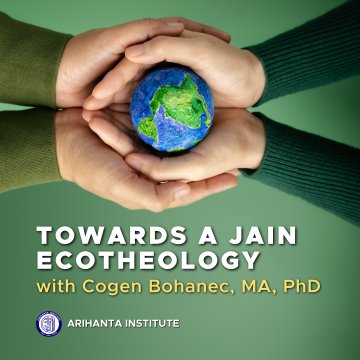
1010 | Towards a Jain Ecotheology
Added to cart
1010 | Towards a Jain Ecotheology
For millennia, it has been widely recognized that the Jain tradition has been distinctive in its central focus on nonviolence (ahiṃsā) towards all beings (jīva-s). Because of this, Jain theology is uniquely oriented towards healing humanity’s strained relationship with the natural world. For several decades, the field of ecotheology had been developed by various thinkers from multiple world religious traditions, Christian in particular.In this course, we will articulate a clear understanding of the methodology of ecotheology that can provide a framework where religious traditions might effectively advocate and empower ecological healing based on the unique paradigmatic resources of each tradition. This course will then examine what the Jain tradition might contribute to the bourgeoning academic discipline of ecotheology, and how the Jain tradition can play an important, necessary, and unique role in a pluralistic approach to environmental healing.
$99.00 USD
Instructor
Self-paced

1014 | Jainism, Veganism, and Engaged Religion
Added to cart
1014 | Jainism, Veganism, and Engaged Religion
Committed to nonviolence (ahiṃsā) since its ancient beginnings, the Jain tradition has admonished the mistreatment, slaughter, sacrifice, and consumption of animals for thousands of years. In light of these commitments, Jains have traditionally lived a lacto-vegetarian lifestyle, advocated for the legal protection of animals, and have created sanctuaries for animals for centuries. In ancient and medieval scriptural sources, we even find restrictions on the consumption of dairy itself, suggesting potential pre-modern Jain commitments to what would now be referred to as a vegan lifestyle. And today, many Jains have been advocating for veganism in light of the devastating and irreparable harms involved in the production of dairy in contemporary society. This course carefully considers the philosophical and historical underpinnings of Jain Veganism, presenting an opportunity for non-Jain vegans to discover a rich philosophical system aligned with their values, as well as an opportunity for Jains to appreciate the philosophical resources within their own tradition which naturally lead to living an ethical vegan lifestyle.
$25.00 USD
Instructors
Self-paced

1015 | Debunking the Myth of Sustainable and Humane Animal Agriculture
In this course, we will focus on the “greenwashing” and “humanewashing” by animal agriculture. “Greenwashing” is based on the different ways that animal agriculture pretends it is sustainable when it is not; “humanewashing” refers to the different ways that animal agriculture pretends it treats animals well, when it does not. In reality, animal agriculture is one of the single largest drivers of climate change and one of the most cruel industries imaginable; however, much like the tobacco industry and the fossil fuel industries before it, animal agriculture has responded to this reality not by enacting any substantive changes, but by relying on “tricks” of communication, including public relations, media relations, marketing, and even attempts to influence scholarship on the topic to confuse the public and hide their destructive practices. In this course, we will debunk these rhetorical tricks and expose the reality of the harms animal agriculture is causing to both animals and our planet. This course should be of benefit to any activist, policy maker, or person concerned about climate change, environmental destruction, or animal suffering. Course Details6 hours of recorded video contentWeekly readings for self-studyAccess to class materials begins Monday, August 5, 20244 scheduled Live Q&A sessions with Professor Stanescu on August 9, 16, 23, and 30 from 9AM to 10AM Pacific + Bonus Session Sept. 6!
$25.00 USD
Instructor
Self-paced
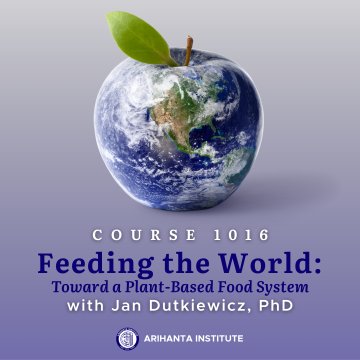
1016 | Feeding the World: Toward a Plant-Based Food System
The global food system is a paradox: it is at once incredibly productive and terribly destructive. Perhaps nowhere is this paradox more evident than in animal agriculture, which feeds billions of people but causes widespread environmental, public health, and ethical problems. This course asks what the food system would look like without large-scale animal agriculture and what the benefits and challenges would be to feeding the global population on a plant-based diet. This course will introduce students to the concept of food systems and food system analysis, delve into the impacts of animal agriculture, and sketch out the possibilities for building a plant-based food system. Course Details6 hours of recorded video contentWeekly readings for self-studyAccess to class materials begins Monday, October 7, 20244 scheduled, 60-minute Live Q&A sessions with Professor Dutkiewicz on October 15, 18, 25, and November 1 from 8AM to 9AM PacificCourse Materials will be available beginning Monday, October 11, 2024.
$25.00 USD
Instructor
Yoga, Self-care and Spirituality
Self-paced
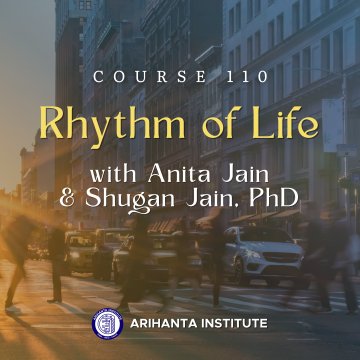
110 | Rhythm of Life
Added to cart
110 | Rhythm of Life
Take a journey within, to understand better your values, beliefs and desires. Everything in the universe has a rhythm, the sun rises and sets, the phases of the moon, the ebb and flow of tides, the changing of seasons, similarly human life has ups and downs, delight and despair, love and loneliness, health and disease, abundance and lack and so on. But we forget this and at times we feel stuck in our suffering, or we question our own self-worth, we feel lost, disconnected with our inner resources and guidance and life starts feeling like it has gotten off course. The Rhythm of Life program offers you a space to reflect, learn and discover your own rhythm and take charge in your life to experience greater fulfilment, connection, healing, restoration, and harmony in life.The program is based on the Jain principle “Jina- Be a Conqueror of the self” applied to a householder lifestyle. With better understanding of our true self, we can evolve, overcome ourobstacles and limiting beliefs, and take charge of our overall well-being and happiness. There are 4 main modules in this course, which bring together various Indian philosophical traditions with a special emphasis on Jain philosophy, modern scientific research, and real life experiences.Learning Objectives:1. Develop a toolkit to lead a happier and holistic life.2. Understand human suffering and its purpose in our lives.3. Become more conscious of values-based living.4. Redesign beliefs to harmonize your inner and outer worlds.5. Create new habits to become the best version of yourself.
$99.00 USD
Instructors
Self-paced

1000 | Foundations of Jain Studies
Added to cart
1000 | Foundations of Jain Studies
This course offers an introduction to Jain Studies. Begin with an exploration of key Jain teachings and practices, focusing on the principles of non-harming (ahiṃsā) and non-possession (aparigraha), both central to the tradition. Delve, then, into the Three Jewels of Jainism—right worldview, right knowledge, and right conduct—and examine how these principles shape the foundation of the Jain tradition. Next, investigate the profound connection between Jainism and animal advocacy, exploring the teachings of Mahavira on animals as well as contemporary Jain practices of animal care. Afterwards, explore the Jain perspective on the human body, including the importance of health, the role of karmas in shaping one’s embodiment, and the fine line between bodily renunciation and the need to have good health. Finally, observe how Jainism’s commitment to compassion and social justice is expressed through transformative social initiatives, focusing on the work of Acharya Chandanaji and the global reach of her charitable organization, Veerayatan. Learning Objectives:Understand the core principles of Jainism, including the practices of non-harming (ahiṃsā) and non-possession (aparigraha).Analyze the Three Jewels of Jainism (right worldview, right knowledge, and right conduct).Evaluate the relationship between Jainism and animal advocacy.Learn the Jain perspective on the human body and its role in spiritual practice.Assess the role of compassion and social justice in Jainism.
Free
Instructor
Self-paced

1002 | Yoga & Meditation for Daily Life – Stress Management
This class seeks to bring the conceptual framework of the textual tradition of Jain Yoga to life by engaging in contemplative practices that have been practiced since ancient times across Dharma Traditions.
$99.00 USD
Instructor
Self-paced

2005 | Demystifying Anekāntavāda
Added to cart
2005 | Demystifying Anekāntavāda
Explore the history, philosophies, and many meanings of the popular Jain concept known as “anekāntavāda”. Begin by exploring anekāntavāda’s rich history and understand why this term means much more than just “intellectual ahiṃsā”. Next, appreciate the philosophical complexity of anekāntavāda and its variant applications through nayavāda, syādvāda, saptabhaṅgī, and nikṣepa.Finally, with this philosophy and history in mind, bring your fresh and deeper understanding of anekāntavāda into the present and apply it to one of many important questions of contemporary society.
$99.00 USD
Instructor
Self-paced
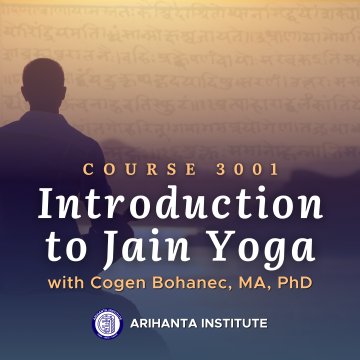
3001 | Introduction to Jain Yoga
Added to cart
3001 | Introduction to Jain Yoga
Unpack the ancient and venerable textual tradition of Jain yoga. Explore the theory behind the psychology and contemplative states of Jain yoga. Study the vocabulary and conceptual frameworks of the Jain yoga tradition.
$99.00 USD
Instructor
Self-paced
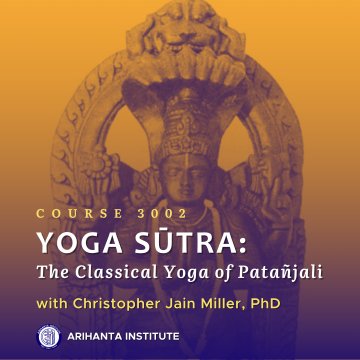
3002 | Yoga Sūtra: The Classical Yoga of Patañjali
Added to cart
3002 | Yoga Sūtra: The Classical Yoga of Patañjali
Master the philosophy, goals, & practices of Patañjali’s Yoga Sūtra & identify its Jain, Buddhist, & Vedic influences. Understand the history that allowed this text to become a text in the modern yoga canon. Learning Objectives• Learn the classical yoga of Patañjali’s Yoga Sūtra and Vyāsa’s Bhāṣya• Take time to reflect on and incorporate Patañjali’s principles into daily life• Learn the text's Sanskrit vocabulary in depth to penetrate its deeper meaning• Understand the Yoga Sūtra’s ancient as well as modern colonial history
$99.00 USD
Instructor
Self-paced
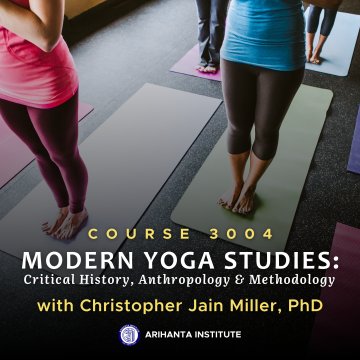
3004 | Modern Yoga Studies: Critical History, Anthropology and Methodology
One of the primary questions students of modern yoga seek to answer is precisely how the forms of contemporary yoga practiced today are connected to pre-modern forms of yoga developed in India. To begin to answer this question and to formulate new questions, this course will trace some of the historical continuities and discontinuities between pre-modern and modern yoga practices, demonstrating that modern yoga is a complicated, transnational cultural product. We will explore the legacy of the first yoga teachers who brought yoga to America and Europe as well as yoga’s development from a historical, social, and political perspective.Students will thus take into account current scholarly debates regarding the relationship of transnational yoga to categories such as capitalism, neoliberalism, orientalism, racism, speciesism, gender, cultural appropriation, biopolitics, nationalism, and colonization. Doing so will encourage yoga practitioners to adopt new methodologies concerning the critical study of modern yoga, and will also give them an opportunity to confront and unravel saṃskāras, or acquired mental impressions and social conditionings, related to their inherited beliefs regarding the origins, history, and contemporary practice of yoga. The course is thus simultaneously intellectual as well as, from a yogic perspective, transformational.
$99.00 USD
Instructor
Self-paced
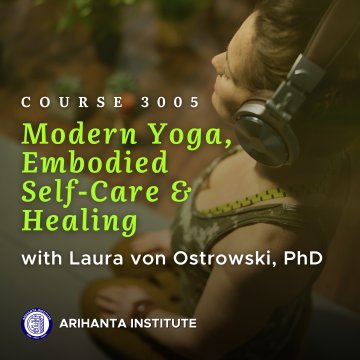
3005 | Modern Yoga, Embodied Self-Care and Healing
Added to cart
3005 | Modern Yoga, Embodied Self-Care and Healing
This course builds on the understanding of modern yoga as a set of historically evolved body-mind practices and discourses that developed into an effective, late-modern self-care. Based on this definition, contemporary yoga – inspired by both pre-modern practices, such as āsana and prāṇāyāma as well as more modern practices, such as mindfulness, body awareness or relaxation techniques – can be defined as a highly efficient tool for self-care. It continues to evolve by adapting to contemporary needs and contributes to the health of late modern societies.In 1946, the World Health Organization defined “health” as complete physical, mental, and social wellbeing. Thus, cultural studies can and have to contribute to such a holistic understanding of health with their view on humans as biological, but likewise social, ritual, symbolic and deeply interconnected beings, very much so via their bodies.But how can this insight be brought into practice? The course examines theories on embodiment and body knowledge and enriches our existing, individual yoga practice with additional, accessible, and highly efficient tools for self-care. It helps developing a more elaborate and sophisticated language as well as a deepened understanding for embodied processes. This includes the knowledge and training of our external and internal senses, getting to know our individual body image and understanding that how we talk to ourselves matters. We investigate the body scheme, understand the importance of touch, flow-states, relaxation, and other techniques that we can employ for both, getting to know but also to transcend ourselves as well as to understand ourselves as fully interconnected beings. Knowing one’s own body in such elaborate ways can, in a yogic manner, help to unlearn embodied habits and conditioning and to gain distance from them whenever needed.
$99.00 USD
Instructor
Self-paced
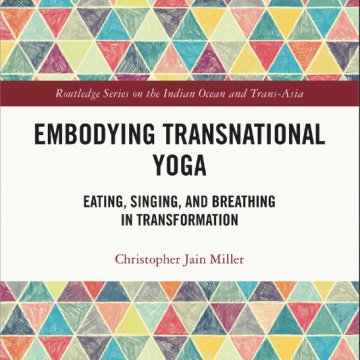
3006 | Embodying Transnational Yoga
Added to cart
3006 | Embodying Transnational Yoga
"Yoga is more than āsana" is a phrase we commonly hear in the contemporary yoga world. But what does this actually mean in practice? In this course we will explore the ways yoga practitioners engage in the practice of eating, singing, and breathing. We will learn about these three transformative, yet understudied embodied yoga practices: yogic diet, music, and breathing techniques. While embracing philosophical, philological, and historical approaches to the study of these practices, this course also presents novel cultural approaches for understanding each following the methodology in Professor Miller’s book, Embodying Transnational Yoga: Eating, Singing, and Breathing in Transformation. Students will move through three contemporary sites of yogic practice where they will learn about the social-historical and cultural forces that both shape and enable particular ways of yogic eating, singing, and breathing therein. By combining the field of yoga studies with Indian Ocean Studies, Food Studies, Ethnomusicology, and Pollution Studies, they will learn that when they embody their own yoga traditions’ transformative practices, they are also simultaneously embodying other unseen cultural and social-historical influences. Students will therefore also learn how to perform research in their own yoga tradition or community to better understand and communicate to others the often unrecognized and complex histories, social contexts, and philosophies comprising their embodied yoga practices. Professor Miller will take students through a systematic approach for performing yoga research to help each participant identify their own key research questions concerning their yoga tradition’s embodied practices and techniques. They will also be inspired to develop their own research methods that will help them to answer these critical questions, thereby becoming a scholar of their own yoga tradition. The only prerequisite for this course is a sincere curiosity to learn about the historical sources and cultural influences shaping contemporary yoga practices whether they are eating, singing, breathing, or another transformative yogic technique of special interest. This course is offered in collaboration with Yogic Studies
Instructor
Self-paced

3007 | Ancient and Classical Jain Yoga
Added to cart
3007 | Ancient and Classical Jain Yoga
This course provides an in-depth exploration of yoga and meditation as understood within ancient and classical Jain scriptures. In Part 1: Ancient Jain Yoga, students will be introduced to foundational concepts such as āsana, or physical postures, as a tool for purification and meditation. Drawing from early Jain texts, including the Uttarādhyayanasūtra and the Daśavaikālikasūtra, students will learn how restraint of the body, mind, and speech formed early Jain definitions of yoga. Part 2: Yoga and Meditation in Classical Jain Philosophy, transitions into an examination of the Tattvārthsūtra and its commentaries, where yoga is described as the inflow (āsrava) of karma—representing an obstacle to spiritual liberation. Students will explore the key to liberation through correct worldview, knowledge, and conduct, as well as the role of dhyāna (meditation) as both an austerity (tapas) and a means of wearing away (nirjarā) karma. Through a discussion of virtuous (dharma) and pure (śukla) meditation, the course will highlight how advanced meditation practices lead to spiritual purification and the elimination of karma, providing a comprehensive understanding of Jain yoga's ultimate aim of mokṣa, or liberation. This is designed as a two-week course that will take approximately 4 hours to complete, and includes readings and a series of 10 lectures to guide you through the intricacies of ancient and classical Jain definitions of Yoga. Learning Objectives:Learn the role of āsana (physical postures) in ancient Jain yoga as a tool for purification and meditation.Discover how restraint of body, mind, and speech formed early Jain definitions of yoga, with guidance from key ancient texts.Explore the classical Jain philosophical view of yoga as the inflow (āsrava) of karma, and see how this concept is discussed in the Tattvārthsūtra and its commentaries.Understand how meditation (dhyāna) serves as an austerity (tapas) to wear away karma (nirjarā) and how virtuous (dharma) and pure (śukla) meditation practices lead to spiritual purification and liberation (mokṣa).
$99.00 USD
Instructor
Self-paced

3008 | Yogabindu & Yogadṛṣṭisamuccaya: The Yogas of Haribhadrasūri
This course offers a close exploration of the teachings and historical contexts of two significant teachers of early Śvetāmbara Jain yoga: Haribhadra Virahāṇka and Haribhadra Yākinīputra.Beginning with an introduction to Haribhadra Virahāṇka’s (ca. 6 th c. CE) hagiography, we will examine how his legendary name reflects the Jain path to liberation (mokṣa), setting the stage for a study of his yoga texts aimed for the same goal: the Yogabindu and Yogaśataka. In addition to looking at the limited historical evidence regarding Haribhadra Virahāṇka’s tentative 6 th c. CE dating, the course will analyze Haribhadra’s categorization of yoga practitioners into three levels, with a focus on the cāritrin (pathgoer), who embodies the path of comprehensive Jain yoga practice. Through a detailed examination of the five types of yoga in the Yogabindu, students will understand how these practices facilitate liberation according to Jain karma theory. Students will also appreciate how the Yogabindu represents Jainism’s first-known exposition of “yoga” as a spiritual path, rather than something that causes the inflow of karma as understood in the preceding classical period.Transitioning to Haribhadra Yākinīputra (ca. 8 th c. CE), the course will delve into his hagiography as well as his distinct contributions to Jain yoga, the Yogadṛṣṭisamuccaya and Yogaviṁśikā. We will investigate how Haribhadra Yākinīputra is historically (and tentatively) dated to the 8 th c. CE, while also appreciating how he both integrates but also simultanesouly critiques various traditions such as tantra, Buddhism, and Brahmanism within his Jain framework. Finally, students will understand how Haribhadra maps his yoga philosophy onto not only Patañjali’s 8-limbed yoga but also Jain concepts including the 14 guṇasthānas. Students will appreciate how the two Haribhadras put their respective Jain teachings into dialogue with other religious and philosophical traditions, while maintaining a commitment to their own Jain tradition.This is designed as a two-week course that will take approximately 4 hours to complete, and includes readings and a series of 10 lectures to guide you through the intricacies of the yogas of Haribhadra Virahāṇka and Haribhadra Yākinīputra. It is recommended, though not required, that students complete course 3007 “Ancient and Classical Jain Yoga” before taking this course if they wish to have further background on Jain yoga. Learning Objectives:1. Learn the histories and hagiographies of Haribhadra Virahāṇka and Haribhadra Yākinīputra to understand how their legendary names were created.2. Understand Haribhadra Virahāṇka’s categorization of yoga practitioners, focusing on the cāritrin and the five types of yoga practices in the Yogabindu, to grasp their role in facilitating liberation through Jain karma theory.3. Learn the contributions of Haribhadra Yākinīputra to Jain yoga, especially hisYogadṛṣṭisamuccaya, and how he critiques and integrates various traditions such as tantra, Buddhism, and Brahmanism within his yoga framework.
$99.00 USD
Instructor
Self-paced
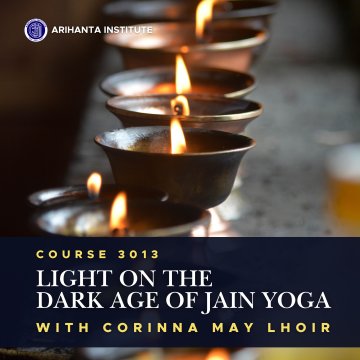
3013 | Light on the Dark Age of Jain Yoga
Added to cart
3013 | Light on the Dark Age of Jain Yoga
This course from the Center for the Study of Jain Yoga, explores Jain Yoga from the 11th to the 17th century CE, often considered the "Dark Age" for Jain Yoga. We will investigate the evolution of Jain Yoga, its interaction with other Indian spiritual traditions, particularly Hatha Yoga and the Bhakti movement, and its role in shaping broader yogic traditions. The course will also examine key texts, including the Yogapradīpa and the Yoga Battīsī, and their commentaries, focusing on how Jain scholars integrated physical, spiritual, and devotional practices into their teachings. Learning Objectives:• Understand the evolution of Jain Yoga during the medieval period and its relationship with other Indian traditions.• Analyze the influence of Hatha Yoga and the Bhakti movement on Jain Yoga practices.• Study the Yogapradīpa and Yoga Battīsī as central texts and explore their impact on Jain spiritual practices.• Engage with Jain Yoga's approach to atma-paramatma (individual and universal consciousness), and meditation.
$99.00 USD
Instructor
Self-paced
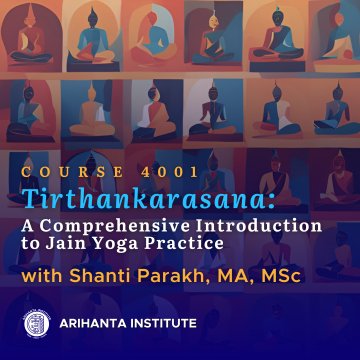
4001 | Tirthankarasana: A Comprehensive Introduction to Jain Yoga Practice
The goal of Jain yoga and meditation is to make progress towards liberation. The purpose of this course is to learn the proper practice of āsanas (poses) related to each of the 24 Tīrthaṅkāras, integrated with related mantras. Each class will consist of yogāsanas, mantras, prāṇāyāma, and dhyāna along with related theory. By dedicated practice of these limbs of yoga, we honour the Tīrthaṅkāras and are continuously inspired by their example.Jain yoga can be practiced by Jains of all sects, as well as by non-Jains. Students will start to understand the true potential of the soul by understanding how the practice of Jain yoga can help shed karma, prevent the influx of new karma, and allow an individual to progress in spiritual development. This is a course of learning and doing. Theoretical background will be provided, but you will be expected to practice what is being taught to the best of your ability.
$99.00 USD
Instructor
Self-paced
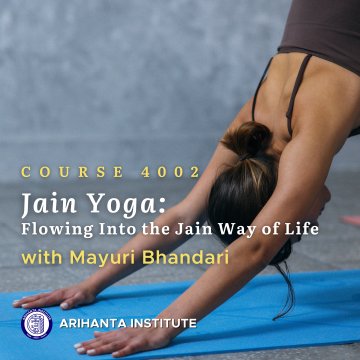
4002 | Jain Yoga: Flowing into the Jain Way of Life (for NextGen)
Modern Yoga in the Western space tends to be more postural based, often limited to the mat in a studio setting. In this class, you will dive deeper using Asana, Pranayama, & Meditation techniques through a Jain lens- with an emphasis on applying Jain ethics/concepts in your physical practice [internally & externally] and in life. This Vinyasa flow based class will also focus on mental, emotional, & spiritual growth. Class discussion will follow to integrate these concepts. This class is open for all levels, and instruction is in English.
$99.00 USD
Instructor
Upcoming

5001 | Samyag-darśana
Added to cart
5001 | Samyag-darśana
सम्यग्दर्शन: जैन दर्शन की मूलभूत अवधारणा का दार्शनिक विश्लेषण जैन दर्शन भारतीय दार्शनिक परंपरा का एक अत्यंत सूक्ष्म, तत्त्वनिष्ठ एवं आत्मसाक्षात्कारोन्मुखी दृष्टिकोण है, जिसकी मौलिकता आत्मा के स्वाभाविक शुद्ध स्वरूप की पुनःप्राप्ति में निहित है। इसके अनुसार, जीव के बंधन का मूल कारण अविद्या, राग, द्वेष, और मिथ्यात्व है। इन बंधनों से मुक्ति प्राप्त करना ही मोक्ष है, जो जैन मत में जीवन का चरम और परम लक्ष्य है।मोक्ष की सिद्धि सम्यग्दर्शन, सम्यग्ज्ञान, और सम्यक् चारित्र — इन त्रिविध साधनाओं से होती है, जिन्हें सामूहिक रूप से "रत्नत्रयी" कहा गया है। इनमें सम्यग्दर्शन को प्रवेशद्वार का स्थान प्राप्त है। इसका तात्पर्य आत्मा की प्रकृति, तत्त्वों की वास्तविकता, और जीवन के लक्ष्य के प्रति श्रद्धायुक्त स्पष्ट दृष्टि से है। उपयोगिताछात्र सम्यग्दर्शन के शास्त्रीय, व्यावहारिक, और आध्यात्मिकपक्षों को स्पष्ट रूप से समझ पाएंगे।वे मिथ्यात्व के लक्षणों को पहचानकर आत्म-निरीक्षण कर सकेंगे।सम्यग्दर्शन की प्राप्ति की प्रक्रिया को समझकर अपने साधना पथ को सुस्पष्ट बना सकेंगे।सम्यग्दर्शन के आधार पर मोक्षमार्ग का सारगर्भित चिंतन कर सकेंगे। Samyag-darśana: A philosophical analysis of the foundational concept in Jain philosophy Jain philosophy is a profoundly subtle, truth-centered, and self-realization-oriented perspective among the Indian philosophical traditions. Its fundamental conviction is in the re-attainment of the soul’s intrinsic pure nature. According to Jain thought, the root causes of the soul’s bondage are ignorance (avidyā), attachment (rāga), aversion (dveṣa), and deluded perception (mithyātva), and elimination of these bondages leads to mokṣa itself, which is regarded as the greatest and ultimate goal of human life in Jainism. The attainment of mokṣa is made possible through the triad of samyag-darśana (right perception), samyag-jñāna (right knowledge), and samyag-cāritra (right conduct), collectively known as the ratnatraya (Three Jewels). Among these, samyag-darśana is accorded the status of the initiator. Its attainment implies a reverence-filled unblemished perception of the nature of the soul, unwavering belief in fundamental principles (tattvas), and the true purpose of life. Learning Objectives:• Understand the importance of samyag-darśana in the spiritual journey.• Identify forms of Mithyatva (false beliefs) and their classifications.• Define samyag-darśana and explore its various types.• Learn about the sequence of attaining samyag-darśana and the concept of Granthibheda (breaking of knots of delusion).• Explore the eight limbs (aṅgas) of samyag-darśana.• Analyze the offenses (dūṣaṇa) and ornaments (bhūṣaṇa) of samyag-darśana.• Recognize samyag-darśana as the foundational step in the path of self-realization.• Understand the relationship between samyag-darśana and svānubhūti (direct self-experience).
 This course meets live on Zoom, weekly on Saturdays (Aug 30 - Nov 29 at 8 AM PT | 4 PM UK | 8:30 PM IST).
This course meets live on Zoom, weekly on Saturdays (Aug 30 - Nov 29 at 8 AM PT | 4 PM UK | 8:30 PM IST).$99.00 USD
Instructor
Professional Ethics
Self-paced

1003 | Foundations for the Study of Jain Professional Ethics
Learn about Jain ethics and how it intersects with contemporary business and professional ethics. Discuss core ideas about how to incoporate Jainism into one’s career with leading professionals in law, medicine, techonlogy, enviorment, and business.
$99.00 USD
Instructor
Self-paced
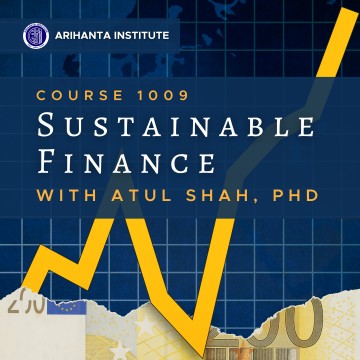
1009 | Sustainable Finance
Added to cart
1009 | Sustainable Finance
Given the growing call for sustainability, finance needs to change its old habits of greed, profit and wealth maximization, but how and in which direction? Are the existing tools of investment evaluation sufficient or problematic? In this elective, diverse cultures and communities of finance will provide examples of how ethical finance practice is often hiding in plain sight. The contemporary science of finance lacks the tools and language to explore these wisdoms, primarily because it has ignored them and seen them as irrelevant or even a barrier to progress and profit.In the class, sustainable ideals and practices of finance will be shared and shown to work in growing business AND contributing to community and society at the same time. Animals and Nature are not ‘othered’ or ‘exploited’ in this business practice but respected and nurtured as human beings are seen as humble trustees rather than destructive and careless overlords.
$99.00 USD
Instructor
Self-paced

1013 | Jain Philosophy and Professional Ethics
Added to cart
1013 | Jain Philosophy and Professional Ethics
This course begins in the first lesson by considering the limits of professional and philosophical ethics education. In the second lesson, it considers texts and concepts in Jainism and Jain ethics insofar as they serve to facilitate reflection on these limits, fostering dialogue on foundational issues in professional ethics. In the final four lessons, Jain four major components of the Jain ethical outlook are explored in relation to professional ethics. In turn, it considers the relationship between self-perception and ethical outlook, the necessity of harm or violence, the validity of anthropocentrism, the moral tenability of the pursuit of affluence, and the need for a balance between personal and professional morality. Rather than proposing a Jain-inspired system of professional ethics for students to consider adopting, this course aims to provide opportunities for students to reflect upon and adjust the foundations of their professional ethical outlook in conversation with plausible Jain ideas and arguments about how we ought to think, speak, and act.
$99.00 USD
Instructor
Social Justice
Self-paced

1000 | Foundations of Jain Studies
Added to cart
1000 | Foundations of Jain Studies
This course offers an introduction to Jain Studies. Begin with an exploration of key Jain teachings and practices, focusing on the principles of non-harming (ahiṃsā) and non-possession (aparigraha), both central to the tradition. Delve, then, into the Three Jewels of Jainism—right worldview, right knowledge, and right conduct—and examine how these principles shape the foundation of the Jain tradition. Next, investigate the profound connection between Jainism and animal advocacy, exploring the teachings of Mahavira on animals as well as contemporary Jain practices of animal care. Afterwards, explore the Jain perspective on the human body, including the importance of health, the role of karmas in shaping one’s embodiment, and the fine line between bodily renunciation and the need to have good health. Finally, observe how Jainism’s commitment to compassion and social justice is expressed through transformative social initiatives, focusing on the work of Acharya Chandanaji and the global reach of her charitable organization, Veerayatan. Learning Objectives:Understand the core principles of Jainism, including the practices of non-harming (ahiṃsā) and non-possession (aparigraha).Analyze the Three Jewels of Jainism (right worldview, right knowledge, and right conduct).Evaluate the relationship between Jainism and animal advocacy.Learn the Jain perspective on the human body and its role in spiritual practice.Assess the role of compassion and social justice in Jainism.
Free
Instructor
Self-paced
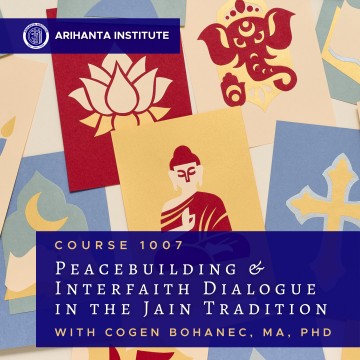
1007 | Peacebuilding & Interfaith Dialogue in the Jain Tradition
In this course we will explore how we can talk with others from different religious (or non-religious) traditions in a way that fosters friendship and mutual respect. We will discuss the Jain tradition’s many resources that further the goals of peacebuilding in a pluralistic society, and what it means to create social unity despite the diversity of perspectives in various belief systems. Given the history of interfaith conflict and violence in our world, the Jain tradition has much to offer in terms of how understanding the religious (or non-religious) “other” and how dialoguing with those who have fundamentally different beliefs can be a source of friendship, harmony, and strength, rather than conflict and disunity as it so often is.We will also discuss how such interfaith dialogue can be understood not only in social terms, but in the Jain philosophical terms of anekānta-vāda, ahiṃsā, etc. such that interfaith interactions can be a means of our own personal spiritual development—as well as social unity at a time when people seem more polarized than ever. We will also give particular emphasis to how the Jain tradition has employed a shared framework of yoga to dialogue with other dharma traditions, and what this tells us today about the potential for interfaith, intercommunal peacebuilding from the perspective of the Jain tradition.
$99.00 USD
Instructor
Self-paced

1016 | Feeding the World: Toward a Plant-Based Food System
The global food system is a paradox: it is at once incredibly productive and terribly destructive. Perhaps nowhere is this paradox more evident than in animal agriculture, which feeds billions of people but causes widespread environmental, public health, and ethical problems. This course asks what the food system would look like without large-scale animal agriculture and what the benefits and challenges would be to feeding the global population on a plant-based diet. This course will introduce students to the concept of food systems and food system analysis, delve into the impacts of animal agriculture, and sketch out the possibilities for building a plant-based food system. Course Details6 hours of recorded video contentWeekly readings for self-studyAccess to class materials begins Monday, October 7, 20244 scheduled, 60-minute Live Q&A sessions with Professor Dutkiewicz on October 15, 18, 25, and November 1 from 8AM to 9AM PacificCourse Materials will be available beginning Monday, October 11, 2024.
$25.00 USD
Instructor
Self-paced

1019 | Veganism in Pop Culture
Added to cart
1019 | Veganism in Pop Culture
This course will look at fictional representations of animal advocacy; vegan practices and values like recognition and compassion; and farmed, free living, and companion animals in popular Anglophone, Western popular media, and participants will learn how these have shaped our relationships to animals and animal ethics in modern history.bell hooks discusses her book Outlaw Culture in relation to her concerns with problematic patterns appearing in popular culture. She tells how sometimes she found the best way to teach students or individuals about "otherness" was by relating it to a medium they were familiar with, the media and popular culture. Unlike critical theory that may be hard for a lot of people to access or understand, popular culture is for the masses and is easily understood. Thus, the masses are far more likely to be educated by popular culture rather than theory-based essays.
$25.00 USD
Instructor
Live Online

1020 | Foundations of Animal Ethics
Added to cart
1020 | Foundations of Animal Ethics
Many sense that something is very wrong in the way that humans treat animals, but also may struggle to articulate why that is the case. This course offers a survey of some significant ways that scholars and activists have articulated systematic accounts for why we ought to seriously value animal life. We will do so not solely for academic interest, but because understanding the “why” of animal ethics is crucial to shaping the “how” of individual and political action to reduce animal suffering and domination. We will examine: the contemporary state of animal suffering, foundational theories for ethically considering animal life, and the academic cutting edge of animal issues.
 Course begins Monday, August 4, 2025 + 4 Live Zoom Q&A sessions August 8, 15, 22, and 29 at 9 a.m. PDT.
Course begins Monday, August 4, 2025 + 4 Live Zoom Q&A sessions August 8, 15, 22, and 29 at 9 a.m. PDT.$25.00 USD
Instructor
Upcoming

1021 | Gender, Animals, and Veganism
Added to cart
1021 | Gender, Animals, and Veganism
In the West, despite considerable evidence to the contrary, veganism continues to be viewed as the purview of a white, upper-middle class left-leaning subculture. It is often depicted as an elitist endeavor. It is gendered as a female undertaking and, therefore, often dismissed as naively emotionally motivated—or characterized as disordered consumption.In this course, we will examine the role that gender plays in vegan identity and the ways that vegan studies offers a lens through which to read and understand a variety of texts —both fictional and nonfictional—that engage with the oppression of animals and of humans. In all of the texts we will discuss, the female protagonists’ veganism renders them vulnerable to interpretations not of their own making, a striking pattern that we will analyze in detail.
 Course materials available on Monday, Sept 15, 2025 + 4 Live Zoom Q&A sessions Sept 19, 26, Oct 3, and 10 at 9 a.m. PDT.
Course materials available on Monday, Sept 15, 2025 + 4 Live Zoom Q&A sessions Sept 19, 26, Oct 3, and 10 at 9 a.m. PDT.$25.00 USD
Instructor
Self-paced

2014 | Jain Teachings & Practices of Compassion
Added to cart
2014 | Jain Teachings & Practices of Compassion
The Jain tradition is rightly famous for its teachings and practices of ahiṃsā, or nonviolence in thought, word, and action. Less well-known or well-understood is the Jain emphasis on karuṇā or dāyā—compassion. Even admirers of the Jain emphasis on nonviolence might ask whether the Jain ideal is merely one of avoiding harm or if there is a place for doing positive good for the welfare of other beings in this tradition. Given the strong emphasis in this tradition of not harming animals and practicing a vegetarian or vegan diet, some might also ask whether the practice of compassion specifically toward human beings is also important to Jains. The answer to both these questions is an emphatic yes. There is indeed a strong Jain emphasis on living compassionately, and specifically on treating our fellow humans with kindness. This course will explore Jain teachings and practices of compassion–including, but not limited to, compassion directed toward our fellow human beings. All suggested course readings are provided as links and pdfs throughout the course. Learning Objectives:Understand the foundations of compassionate living according to Jain teachings.Learn how the Jain tradition provides rich philosophical resources that encourage us to live compassionately.Learn how teachings and practices of compassion are lived out in the Jain community.
$99.00 USD
Instructor
Self-paced
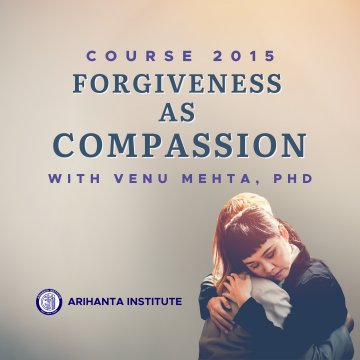
2015 | Forgiveness as Compassion
Added to cart
2015 | Forgiveness as Compassion
Forgiveness or ‘Kṣamāpanā’ is arguably the most important virtue and practice, known to be synonymous to and vital for the practice of non-violence, compassion, and peace for individuals and the global community. As one of the most ancient religious traditions, Jainism is not only rich with the philosophical sources on the concept of forgiveness, but the Jain tradition also offers lived ways to practice forgiveness in our daily life. Learn the Jain way of forgiveness in conversation with non-violence, compassion, and peace.All suggested course readings are provided as links and pdfs throughout the course.Learning Objectives:Understand the foundational philosophy of forgiveness in the Jain tradition.Learn how the Jain tradition provides rich philosophical resources and practices that encourage us “to forgive” and “seek forgiveness.”Incorporate Jain virtues and practices into your own life and significantly contribute to creating a compassionate, non-violent, and peaceful world.
Free
Instructor
Self-paced
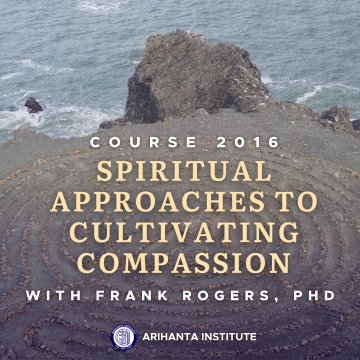
2016 | Spiritual Approaches to Cultivating Compassion
Added to cart
2016 | Spiritual Approaches to Cultivating Compassion
This course explores compassion formation processes that are grounded in Western monotheistic spiritual traditions. These formation processes promote a spiritual path of radical compassion rooted in contemplative encounters with an all-inclusive sacred Source and embodied in compassionate action that extends toward all—one's self, one's neighbor, even one's enemies. This course does not so much study compassion; it explores how to cultivate a compassionate presence in the world through these spiritual traditions. All suggested course readings are provided as links or pdfs throughout the course.Learning Objectives:After taking this course, students will be able to:Understand how to cultivate a connection to a compassionate sacred Source asdescribed in monotheistic spiritual traditions.Understand how to cultivate compassion toward one’s self grounded in western spiritual sensibilities.Understand how to cultivate compassion toward others through western spiritual practices.
$99.00 USD
Instructor
Self-paced
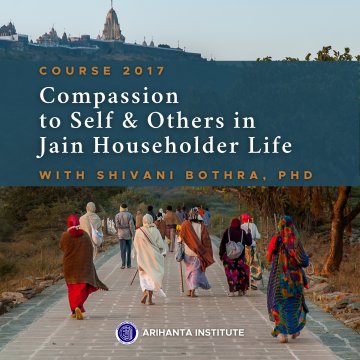
2017 | Compassion to Self & Others in Jain Householder Life
Jain teachers have elaborated on sixty variants of the pan-Indian principle of ahiṃsā (non-violence) in their canonical texts. While physical non-violence—especially the avoidance of harm to any sentient being—is widely recognized both within and beyond the Jain tradition, other dimensions of ahiṃsā focus on fostering compassionate treatment toward not only one’s self but also to fellow humans. This course draws from the Śrāvaka Saṃbodha, a handbook on lay practices compiled by Ācārya Tulasī (1914–1997). This text outlines the qualities (guṇas) of lay disciples and provides practical, didactic guidance on religious conduct, encapsulating the ‘Jain way of life.’ Through these teachings, students will explore how responsible householders can contribute to a compassionate and harmonious society by integrating Jain ethical principles into everyday life. Course readings will be made available as links and PDFs throughout the duration of the course.Learning Objectives:• Examine the Śrāvaka Saṃbodha, a poetic text written in the vernacular (Hindi) and assess its contemporary relevance to ethical and compassionate living.• Understand the multifaceted meanings of compassion within Jain thought and analyze how it transcends conventional notions of kindness and non-violence.• Evaluate, using interdisciplinary approaches from social sciences (such as history and linguistics), the various methods Ācārya Tulasī employs in constructing and communicating the qualities of householders in Jainism
$99.00 USD
Instructor
Self-paced

2018 | Human Security as Compassion: Jain Perspectives on Global Challenges
Feeling safe is one of our biggest needs. But sometimes it seems like we live in an age of uncertainty and increasingly complex global crises. What then does it take today for human beings to feel and be safe?In this course you will learn how Jain thought and practice can speak to each of the seven areas of human security: 1) Personal Security, 2) Health Security, 3) Food Security, 4) Environmental Security, 5) Economic Security, 6) Political Security, 7) Community Security. Human security is not merely a matter of technology and logistics and a task for states and big organizations. It can also be approached as value-based: helping others to feel and be safe as an act of compassion. Underlying the concept of human security is the desire to understand what each individual human being needs to be able to flourish and live a meaningful life. In the course we will discuss different ways of answering this question, from the United Nations sustainable development goals to the wisdom of the Jain scriptures, and how they can inform each other to address today’s global challenges. Learning Objectives:• Understand concepts connected to human security.• Learn about compassionate Jain approaches to today’s global security challenges in both theory and practice.• Develop the way you think about security, both your own and that of others.• Get inspired for compassionate action that makes a difference in people’s lives.
$99.00 USD
Instructor
Self-paced
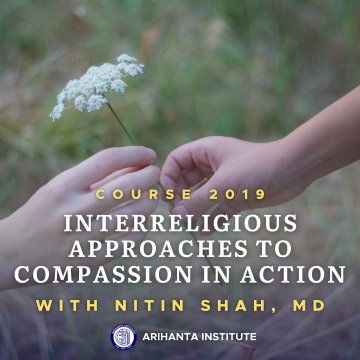
2019 | Interreligious Approaches to Compassion in Action
Added to cart
2019 | Interreligious Approaches to Compassion in Action
The Tattvartbhasya by Haribhadra describes Compassion as a feeling of mercy for those who are miserable. Compassion also known as karuna or anukampa is the most important principle not only to understand but more importantly to practice in everyday life. Learn how all religions preach compassion, and how the Jain tradition takes its own – a unique approach. Compassion remains a central point in understanding three main principles of Jain tradition ahimsa (non-violence), anekantvad (multiplicity of views), and aparigrah (non-possessiveness). Understand the Jain way of practicing compassion and how other religions address the practice of compassion. Also learn the different ways one can be compassionate, as well as the challenges you will face in serving selflessly along with possible ways to overcome them.All suggested course readings are provided as links and pdfs throughout the course. Learning Objectives:Understand compassion/karuna/anukampa following Jain philosophy.Learn compassion teachings by Christian, Islam, Hindu, Sikh, Jewish & Buddhist traditions.Find ways to practice compassion locally in your area.Discover how to help people around the world.Find out how to be a compassionate giving human being.
$99.00 USD
Instructor
Self-paced
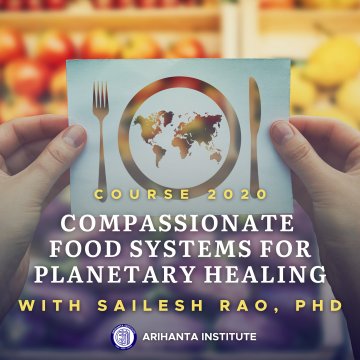
2020 | Compassionate Food Systems for Planetary Healing
Added to cart
2020 | Compassionate Food Systems for Planetary Healing
The global food system is the single largest contributor to the ongoing ecological crisis and humanitarian crisis, impacting every one of the six planetary boundary transgressions that the Stockholm Resilience Center identified in 2023. This necessitates a transformation to a compassionate food system that meets the nutritional needs of all human beings while ensuring that these planetary boundary transgressions are mitigated. In this class, we will examine the architectures of compassionate food systems and how they can be implemented as the foundation of a holistic transformation from the climate heating phase to the climate healing phase of our civilization.Learning ObjectivesUnderstand the Urgency: Articulate the critical need for transforming foodsystems to address ecological crises and social injustices, including theimplications of animal agriculture on planetary boundaries and human health.Define Compassionate Food Systems: Explain the principles of a compassionate food system and its potential to provide nourishing food for all while operating within the limits of planetary boundaries.Analyze Implementation Strategies: Assess the political and economic transformations required to implement compassionate food systems effectively.Facilitate Transformation: Identify grassroots initiatives and strategies to overcome resistance and facilitate the transition to a compassionate food system.
$99.00 USD
Instructor
Upcoming
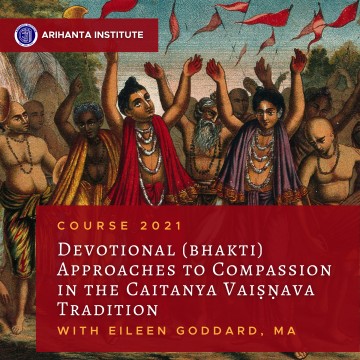
2021 | Devotional (bhakti) Approaches to Compassion in the Caitanya Vaiṣṇava Tradition
Added to cart
2021 | Devotional (bhakti) Approaches to Compassion in the Caitanya Vaiṣṇava Tradition
In Vaiṣṇava devotional (bhakti) traditions inspired by the ecstatic figure Caitanya (1486-1533) from Bengal, central importance is attributed to the loving relationship that each practitioner develops with the supreme Godhead Kṛṣṇa. And yet, such traditions also demonstrate that the foundational love that each practitioner cultivates for the divine must also extend towards other human beings (jīvas). This course begins with analyses of the sixteenth century Gauḍīya Vaiṣṇava tradition’s early development of Caitanya Vaiṣṇava cosmologies, philosophies, principles, practices, and communities. Such analyses highlight how recognizing Kṛṣṇa’s divine presence in other jīvas is the foundation of all love for other embodied beings, such that compassion (kṛpā) functions as an extension of one’s love for Kṛṣṇa. The course explores how community-building, an egalitarian worldview, and the ethic of humility intersect in Caitanya Vaiṣṇava compassion from the sixteenth to twenty-first century. It ultimately highlights how bhakti traditions, although centrally concerned with love for the divine, also remain concerned with extending love and compassion to other human beings. Course materials include a variety of readings that will be provided throughout the course. Learning ObjectivesBy the end of this course, students will be able to:Understand how Caitanya Vaiṣṇava cosmology and philosophy inform ethical ideals.Understand how the centralizing principle of devotion (bhakti) expands from love of the divine to love for other human beings.Learn how Caitanya Vaiṣṇava principles have been translated into a range of compassionate humanitarian actions.
 Available for self-study on Monday, October 6, 2025.
Available for self-study on Monday, October 6, 2025.$99.00 USD
Instructor
Upcoming
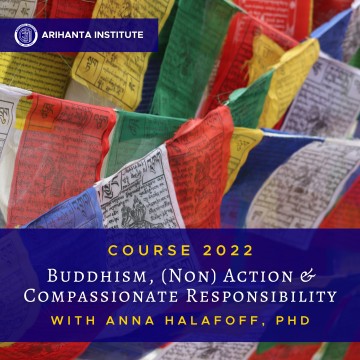
2022 | Buddhism, (Non)Action & Compassionate Responsibility
This course explores Buddhist understandings of compassion, with a particular emphasis on Dzogchen Buddhism. Compassion is a central Buddhist principle, and is typically defined as the wish to free beings from suffering. Consequently, Buddhist teachers provide instructions on how to cultivate compassion extended to oneself, to other humans and all forms of life. This course explores these Buddhist teachings and practices, including Dzogchen’s emphasis on rest and (non)action in which compassionate responsibility naturally arises. All suggested course readings are provided as links or pdfs throughout the course. Learning ObjectivesAfter taking this course, students will be able to:Understand the centrality of compassion in diverse Buddhisms.Practice Loving Kindness and Compassion (Tonglen) Meditations for oneself and others, in a secular or Buddhist way.Realize the importance of rest and (non)action for generating compassionate responsiveness to all forms of life, including oneself.
 Available for self-study on Monday, December 1, 2025.
Available for self-study on Monday, December 1, 2025.$99.00 USD
Instructor
Upcoming
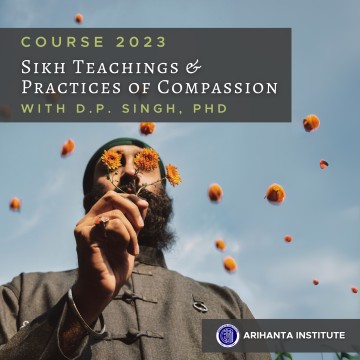
2023 | Sikh Teachings & Practices of Compassion
Added to cart
2023 | Sikh Teachings & Practices of Compassion
The Sikh Dharmic tradition is deeply rooted in the principles of seva (selfless service), sarbat da bhala (welfare of all), and Karuna (compassion). While Sikhi emphasizes the oneness of all creation and the divine presence in every being, it calls for an active engagement in uplifting humanity through righteous action, not merely the avoidance of harm. Sikhs are encouraged to live by the ideals of kirat karni (honest labor), vand chakna (sharing with others), and naam japna (remembrance of the Divine), all of which contribute to a just and compassionate society. Unlike traditions that focus primarily on renunciation or nonviolence as passive ideals, Sikhi promotes a dynamic form of compassion—one that defends the oppressed, stands against injustice, and actively contributes to the well-being of all. The institution of langar (free community kitchen) exemplifies the Sikh commitment to serving humanity without discrimination. Furthermore, the concept of miri-piri (the balance of temporal and spiritual authority) underscores the responsibility of Sikhs to engage in both personal spiritual growth and societal betterment. This course explores the Sikh teachings and practices of compassion—both in their spiritual dimension and in their real-world application—showcasing how the Sikh tradition not only fosters inner transformation but also demands active service and protection of all beings. All suggested course readings are provided as links and pdfs throughout the course. Learning ObjectivesGain a foundational understanding of the Sikh dharmic tradition, including its origins, core beliefs, and practices.Understand the foundations of compassionate living according to Sikh teachings.Learn how the Sikh dharmic tradition provides rich philosophical resources that encourage us to live compassionately and harmoniously with all beings.Learn how teachings and practices of compassion are lived out in the Sikh community.
 Available for self-study on Monday, November 3, 2025.
Available for self-study on Monday, November 3, 2025.$99.00 USD
Instructor
Enrollment Options
14-DAY FREE TRIAL
- Free, unlimited access to our self-paced courses for 14-days.
- Already used your free trial? Enroll in our Monthly or Annual Membership options at anytime and continue learning immediately!
MONTHLY MEMBERSHIP
- $45 USD / Month
-
Immediate access to course
#### | Name. - Unlimited access to our live and self-paced courses for one month, with month-to-month auto rollover.
- Excludes graduate seminars, language courses, and courses hosted on partner platforms.


 Manoj Jain, MD
Manoj Jain, MD Archana Jain Jerath
Archana Jain Jerath Vandana Jain
Vandana Jain Dinesh Jain
Dinesh Jain Christopher Miller, PhD
Christopher Miller, PhD Jeffery Long, PhD
Jeffery Long, PhD Alba Rodriguez Juan
Alba Rodriguez Juan Jonathan Dickstein, PhD
Jonathan Dickstein, PhD Cogen Bohanec, MA, PhD
Cogen Bohanec, MA, PhD Ellen Gough, PhD
Ellen Gough, PhD Patricia Rodrigues de Souza, PhD
Patricia Rodrigues de Souza, PhD Brianne Donaldson, PhD
Brianne Donaldson, PhD Jitendra Shah
Jitendra Shah Hope Bohanec
Hope Bohanec Pratik Bhansali
Pratik Bhansali Sunny Jain
Sunny Jain Nisha Mehta
Nisha Mehta Lenore Braford
Lenore Braford Paul Drake
Paul Drake Vasile Stanescu, PhD
Vasile Stanescu, PhD Renan Larue, PhD
Renan Larue, PhD Jonina Turzi
Jonina Turzi Christopher Sebastian McJetters
Christopher Sebastian McJetters Jishnu Guha-Majumdar
Jishnu Guha-Majumdar Laura Wright
Laura Wright Vinita Dugad
Vinita Dugad Jan Dutkiewicz, PhD
Jan Dutkiewicz, PhD Shugan Jain
Shugan Jain Anita Jain
Anita Jain Laura von Ostrowski, PhD
Laura von Ostrowski, PhD Corinna May Lhoir
Corinna May Lhoir Shanti Parakh
Shanti Parakh Mayuri Bhandari
Mayuri Bhandari Anand Vaidya, PhD
Anand Vaidya, PhD Atul Shah, PhD
Atul Shah, PhD Benjamin Zenk, PhD
Benjamin Zenk, PhD Venu Mehta
Venu Mehta Frank Rogers, PhD
Frank Rogers, PhD Shivani Bothra
Shivani Bothra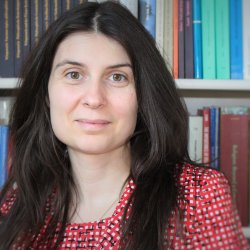 Melanie Barbato, PhD
Melanie Barbato, PhD Nitin Shah
Nitin Shah Sailesh Rao
Sailesh Rao Eileen Goddard
Eileen Goddard Anna Halafoff
Anna Halafoff Devinder Pal Singh, PhD
Devinder Pal Singh, PhD